Snippets
Short snippets of thought. Ramblings. Random shite.
The Cab Ride I’ll Never Forget
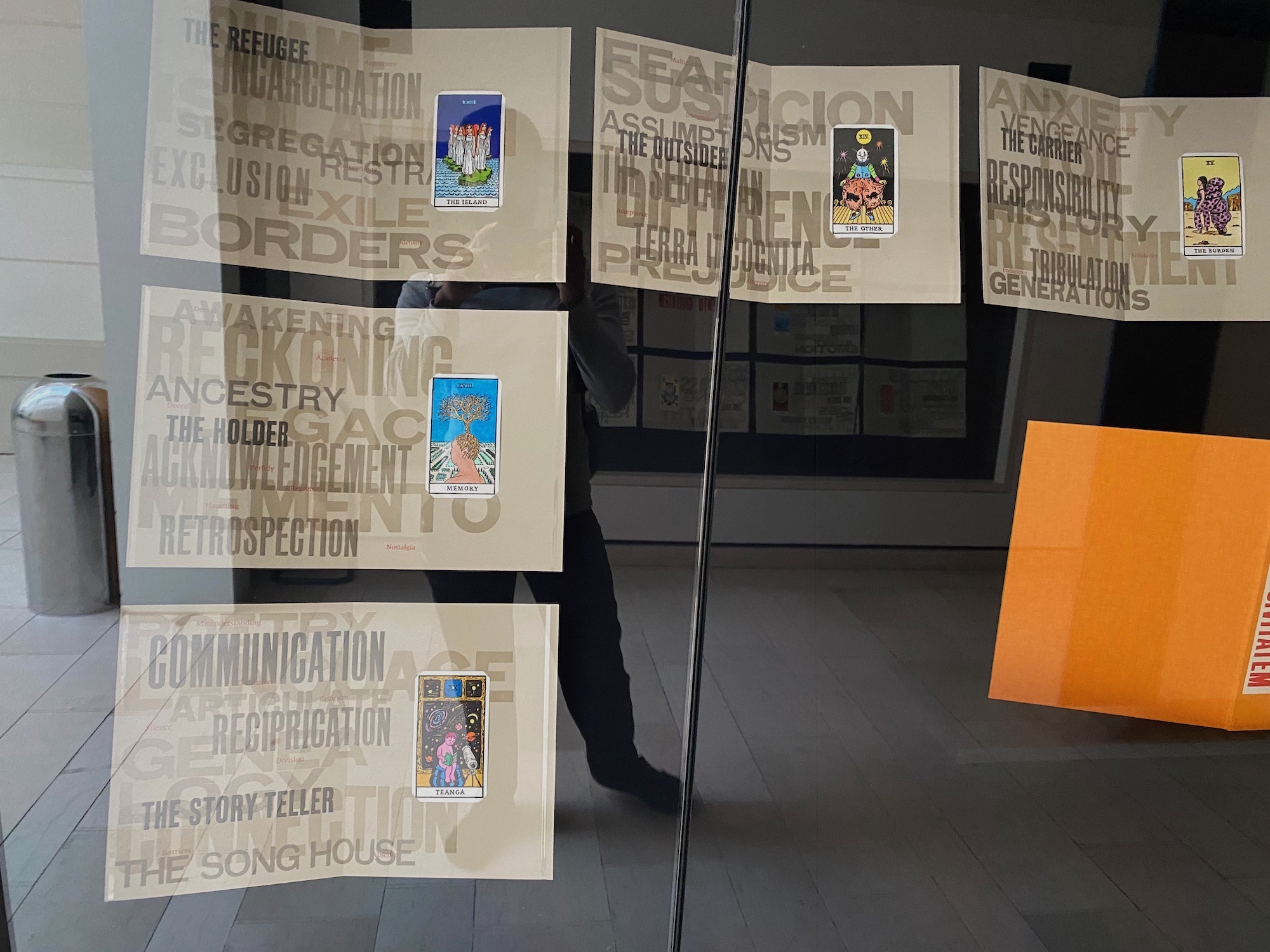
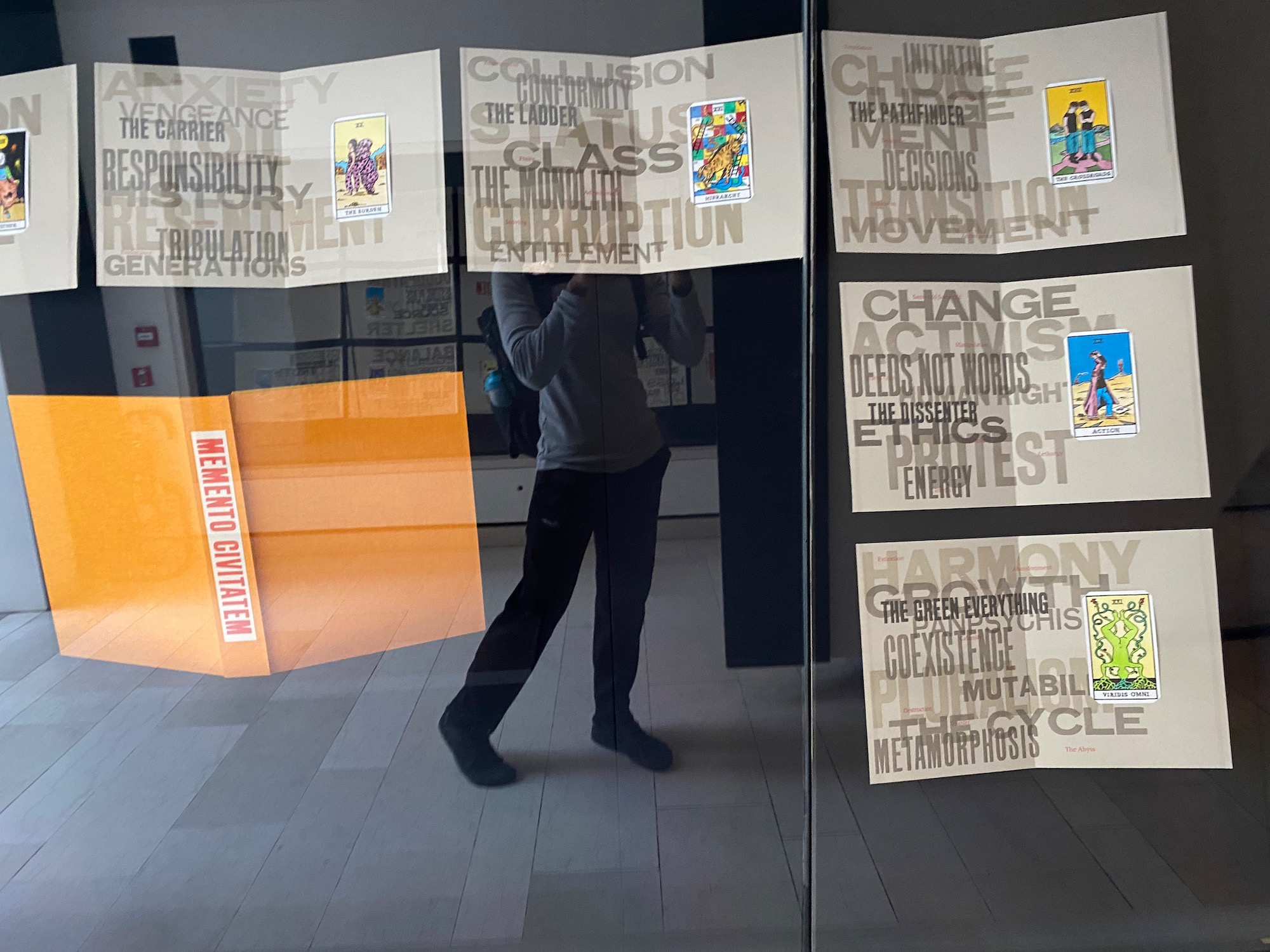
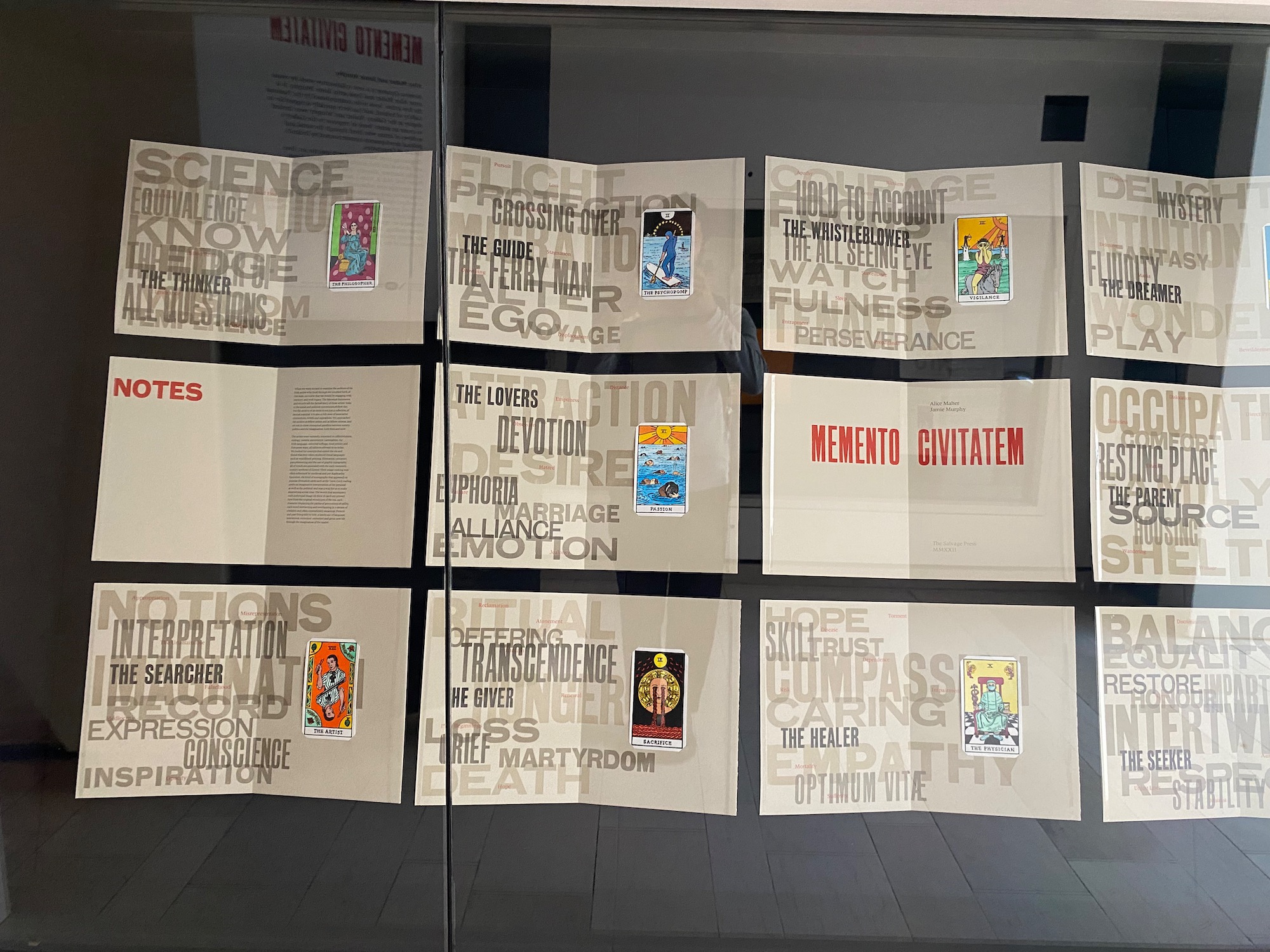
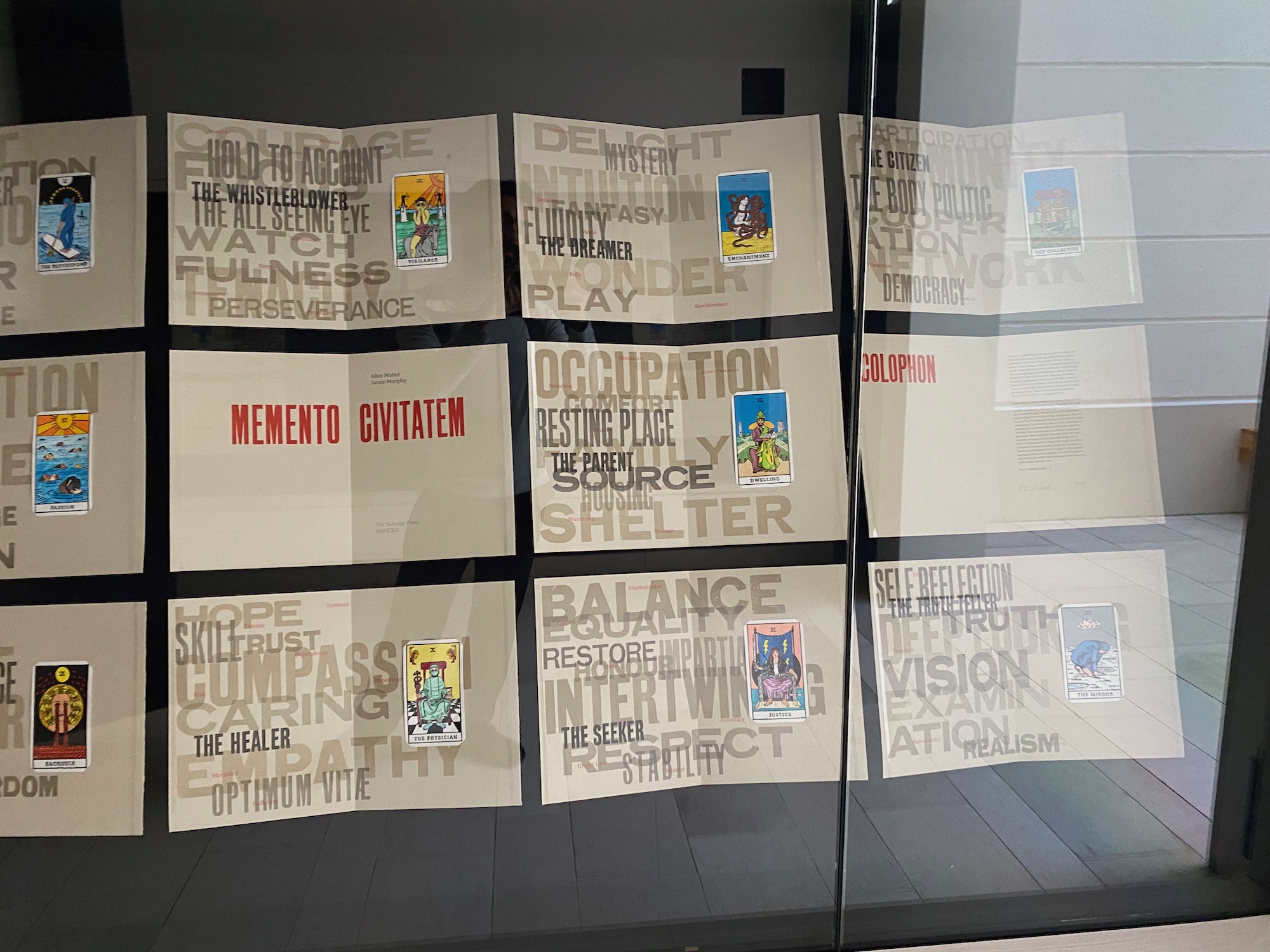
The Opening of the Sixth Seal, Francis Danby
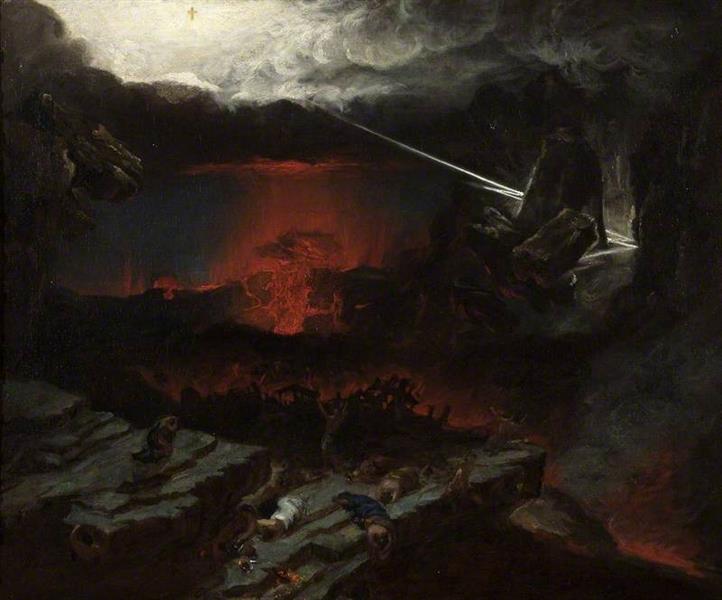
Was thinking about what is creativity: connection of seemingly irrelevant concepts. Puns are creative because they make a non-obvious connection. The connection is not nonsensical, but not obvious either.
On Neurodiversity: Dyslexia is not a disorder if society doesn’t depend on reading so much. Reading new invention. What about people who have trouble using technology? Is that a disorder? Is it a bug of the reading and writing systems or humans? What if it was on a computer screen? Would we think of it still as a disease or would we fix the program?
برای تو و خویش
چشمانی آرزو میکنم
که چراغها و نشانهها را در ظلماتمان ببیند
گوشی
که صداها و شناسهها را در بیهوشیمان بشنود
برای تو و خویش
روحی
که اینهمه را در خودگیرد و بپذیرد
و زبانی
که در صداقت خود ما را از خاموشی خویش بیرون کشد
و بگذارد از آن چیزها که در بندمان کشیدهاست سخن بگوییم
For Yourself and I
I wish for eyes, that can see the lights and signs in our darkness.
Ears, that can hear the sounds and signals in our negligence
For yourself and I,
I wish for a soul, that can accept and embrace all of this,
And a tongue,
That with its honesty, can pull us out of our silence,
And allow us to speak of all the things that hold us captive.
Pieces from Austerlitz: “As I think of how little we can hold in mind, how everything is constantly lapsing into oblivion with every extinguished life, how the world is, as it were, draining itself, in that the history of countless places and objects which themselves have no power of memory is never heard, never described or passed on”
“All I could think was that such a sentence only appears to mean something, but in truth is at best a makeshift expedient, a kind of unhealthy growth issuing from our ignorance, something which we use, in the same was many sea plants and animals use their tentacles, to grope blindly through the darkness enveloping us. The very thing which may usually convey a sense of purposeful intelligence- the exposition of an idea by means of a certain stylistic facility-now seemed to me nothing but an entirely arbitrary or deluded enterprise.”
“I sensed that in truth, I had neither memory nor the power of thought, nor even any existence, that all my life had been a constant process of obliteration, a turning away from myself and the world. If someone had come then to lead me away to a place of execution I would have gone meekly, without a word, without so much as opening my eyes.”
“In this dreadful state of mind I sat for hours, for days on end with my face to the wall, tormenting myself and gradually discovering the horror of finding that even the smallest task or duty, for instance arranging assorted objects in a drawer, can be beyond one’s power.”
“At some time in the past, I thought, I must have made a mistake, and now I am living the wrong life.”
“Marie moved closer to me and asked whether I had remembered that tomorrow was my birthday. When we wake up tomorrow, she said, I shall with you every happiness, and it will be like telling a machine working by some unknown mechanism that I hope it will run well. Can’t you tell me the reason, she asked, said Austerlitz, why ou remain so unapproachable? Why, she said, have you been like a pool of frozen water ever since we came here? Why do I see your lips opening as if you were about to say something, maybe even cry out loud, and then I hear not the slightest sound? Why did you never unpack when we arrived, always preferring to live out of a rucksack, as it were? We stood there a couple of paces apart, like two actors on stage. The colour of Marie’s eyes changed as the light dimmed. And once again I tried to explain to her and to myself what incomprehensible feelings had been weighing on me over the last few days; how I kept thinking, like a madman, that there were mysterious signs and portents all around me here; how it even seemed to me as if the silent facades of the buildings knew something ominous about me, how I had always believed I must be alone, and in spite of my longing for her I now felt it more than ever before.”
“That evening in Marienbad, said Austerlitz, I could not admit to myself how right everything Marie said was, but today I know why I felt obliged to turn away when anyone came too close to me, I know that I thought this turning away made me safe, and that at the same time I saw myself transformed into a frightful and hideous creature, a man beyond the pale.”
“What made me uneasy at the sight of it, however, was not the question of whether the complex form of the capital, now covered with a puce-tinged encrustation, had really impressed itself on my mind when I passed through Pilsen with the children’s transport in the summer of 1939, but the idea, ridiculous in itself, that this cast-iron column, which with its scaly surface seemed almost to approach the nature of a living being, might remember me and was, if I may so put it, said Austerlitz, a witness to what I could no longer recollect for myself.”
“Might it not be, continued Austerlitz, that we also have appointments to keep in the past, in what has gone before and is for the most part extinguished, and must go there in search of places and people who have some connection with us on the far side of time, so to speak?”
“No one can explain exactly what happens within us when the doors behind which our childhood terrors lurk are flung open.”
Paikese suudlus (1917) by Oskar Kallis
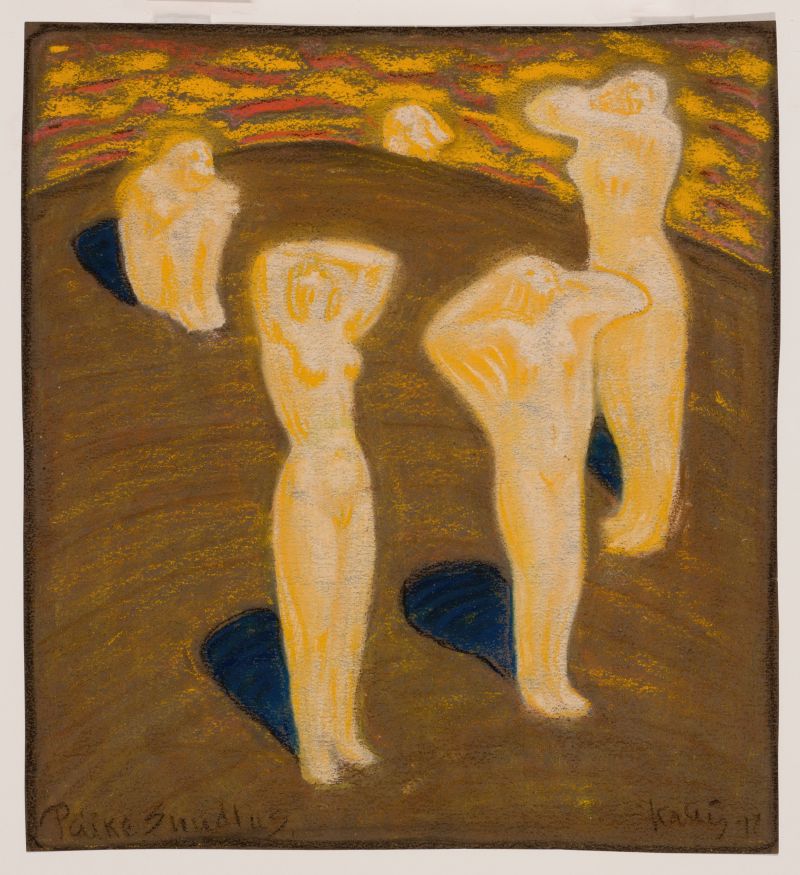
“What if some day or night, a demon were to steal after you into your loneliest loneliness and say to you: “This life as now live it and have lived it, you will have to live once more and innumerable times more; and there will be nothing new in it, but every pain and every joy and every thought and sigh and everything unutterably small or great in your life will have to return to you, all in the same succession and sequence–even this spider and this moonlight between the trees, and even this moment and I myself. The eternal hourglass of existance is turned upside down again and again, and you with it, speck of dust!” Would you not throw yourself down and gnash your teeth and curse the demon who spoke thus? Or have you once experienced a tremendous moment when you would have answered him: “You are a god and never have I heard anything more divine.” If this thought gained possession of you, it would change you as you are, or perhaps crush you.” - Nietzsche
Pieces from The Reader’s Block by David Markson:
“If an ox could paint a picture, his god would look like an ox. Said Xenophanes”
“What has happened? It is life that has happened; and I am old.”
“Despite decades of self analysis, Freud was so anxiety-ridden about missing trains that he would arrive at the station as much as an hour early. Freud.”
Sylvia Plath: Horder prescribed her an anti-depressant, a monoamine oxidase inhibitor, a few days before her suicide. Knowing she was at risk alone with two young children, he says he visited her daily and made strenuous efforts to have her admitted to a hospital; when that failed, he arranged for a live-in nurse. Commentators have argued that because anti-depressants may take up to three weeks to take effect, her prescription from Horder would not have taken full effect. The nurse was due to arrive at nine on the morning of February 11, 1963, to help Plath with the care of her children. Upon arrival, she could not get into the flat but eventually gained access with the help of a workman, Charles Langridge. They found Plath dead of carbon monoxide poisoning with her head in the oven, having sealed the rooms between her and her sleeping children with tape, towels and cloths. At approximately 4:30 a.m. Plath had placed her head in the oven, with the gas turned on. She was 30 years old. She left bread and butter and milk in the bedroom for her two children who were sleeping.
“John Donne posed for a painting in his own shroud. And kept it beside his bed during a long final illness.”
“Manet was so vituperatively condemned by critics that for a time he was too embarrassed to ask anyone to pose for him. Before Cezanne had gained any recognition he once burst into tears when someone sincerely admired his work”
“The Persians deployed so many bowmen at Thermopylae that it was said their arrows would blot out the sun. To which a Spartan commander: all the better, then we will be fighting in the shade In fact only two Spartans survived Thermopylae. One was killed in a battle elsewhere. The other hanged himself in disgrace.”
“At twenty, Bach made a pilgrimage of more than two hundred miles, on foot, to hear Buxtehude play the organ.”
“Aesop was a slave. Terence was a slave. Epictetus was a slave.”
“I am weary, Ananda, and wish to lie down.”
Galileo’s Abjuration 1633 …I abjure with sincere heart and unfeigned faith, I curse and detest the said errors and heresies, and generally all and every error and sect contrary to the Holy Catholic Church. And I swear that for the future I will neither say nor assert in speaking or writing such things as may bring upon me similar suspicion; and if I know any heretic, or one suspected of heresy, I will denounce him to this Holy Office, or to the Inquisitor and Ordinary of the place in which I may be. I also swear and promise to adopt and observe entirely all the penances which have been or may be by this Holy Office imposed on me. And if I contravene any of these said promises, protests, or oaths, (which God forbid!) I submit myself to all the pains and penalties which by the Sacred Canons and other Decrees general and particular are against such offenders imposed and promulgated. So help me God and the Holy Gospels, which I touch with my own hands. I Galileo Galilei aforesaid have abjured, sworn, and promised, and hold myself bound as above; and in token of the truth, with my own hand have subscribed the present schedule of my abjuration, and have recited it word by word. In Rome, at the Convent della Minerva, this 22nd day of June, 1633. I, Galileo Galilei, have abjured as above, with my own ha
“Petrarch sometimes wrote letters to long-dead authors. He was also a dedicated hunter of classic manuscripts. Once, after discovering some previously unknown works of Cicero, he wrote Cicero the news.”
“Poe was expelled from West Point for refusing to obey military orders. Later, James McNeill Whistler would fail there academically.”
“im westen nichts neues: nothing new in the west”
“Impoverished and freezing, Gerard de Nerval hanged himself near a cheap Paris doss-house after no one responded to his late-night knock”
“Walter Benjamin committed suicide at the border between France and Spain in 1940. Fleeing the Nazis, he had been turned back by Spanish authorities.”
“The vocabulary in Shakespeare’s plays includes 29,066 different words. There are 29,899 different words in Ulysses.”
Jarndyce and Jarndyce
Occam’s razor
“Life is a long preparation for something that never happens” -Yeats
“Mark Rothko committed suicide by slashing the inside of his arms at the elbows with a double-edged razor blade. First folding Kleenex over one edge of the blade to keep from cutting his fingers”
“Jacques Louis David’s Death of Socrates shows Plato seated at the scene in despair. In the Phaedo, Plato says he was sick and not there.”
“Horace dictated that a writer should set aside a finished poem for nine years. And only then decide if it is worth publishing.”
“Unquestionably it would have been Mary Magdalen who did the dishes at the Last Supper. Concluded Marguerite Yourcenar.”
Lully died from gangrene, having struck his foot with his long conducting staff during a performance of his Te Deum to celebrate Louis XIV’s recovery from surgery. He refused to have his leg amputated so he could still dance.
“The tyranny of the ignoramuses is insurmountable and assured for all time. Said Einstein.”
“Mithridates. Who as Housman says took poison in small doses, to build an immunity. And was run through by a sword.”
Heinrich von Kleist: On November 21, 1811, the two traveled from Berlin to Wannsee. Prior to their departure, they both penned farewell letters, which along with an account of the final night they spent at the inn Gasthof Stimming, are now part of world literature. Upon their arrival in the vicinity of the Wannsee in Potsdam, Kleist first shot Henriette and then turned the gun on himself. They were buried together in a common grave at Kleine Wannsee (Bismarckstrasse), which has become a tourist attraction.
“Bertrand Russell, re having contemplated suicide at sixteen: I did not, however, commit suicide, because I wished to know more about mathematics.”
“During his interlude with George Sand, Alfred de Musset more than once woke up not long after exhausting sex to find her gone from bed. Intently at work on a novel.”
“Et Verbum caro factum est: And the Word was made flesh”
“Our life is but a warfare and a stranger’s sojourn -Marcus Aurelius”
”‘Come Back to the Raft Ag’in, Huck Honey!’ argued a recurrent theme in American literature was an unspoken or implied homoerotic relationship between men, famously using Huckleberry Finn and Jim as examples. Pairs of men flee for wilderness rather than remain in the civilizing and domesticated world of women.”
“Michelangelo finished The Last Judgement in 1541. Fourteen years later Pope Paul IV ordered Daniele da Volterra to drape forty of the naked figures. Which Salvator Rosa would subsequently suggest made the whole wall look like a public bath.”
“Sweet the nails, sweet the wood
Which bore so sweet a burden”
“Then we will have Homer and Don Quixote, and then we will have saunter and chat, and one more laugh before we die. Said William Cowper, who was mad through most of his life.”
“One does not finish a poem, one only abandons it.”
Verweile doch, du bist so schön: Stay a while, you are so beautiful
Longinus is the name given to the unnamed Roman soldier who pierced the side of Jesus with a lance and who in medieval and some modern Christian traditions is described as a convert to Christianity.
Tasso suffered from mental illness and died a few days before he was due to be crowned on the Capitoline Hill as the king of poets by the Pope.
All of Plato came down from antiquity in less maimed form than any other writings, an undeniable sign of the esteem in which it was held. Nonetheless when Aquinas and other medieval thinkers referred to the philosopher, with no additional identification, it was universally understood that Aristotle was meant.
il maestro di color che sanno: the master of those who know
Within a few days of his death, Akhmatova wrote:
Terror fingers all things in the dark,
Leads moonlight to the axe.
There’s an ominous knock behind the wall:
A ghost, a thief or a rat…
As Nietzsche saw it, the last Christian died on the Cross. (author: Christianity was not a thing until after Christ’s death though)
Mary Shelley was nineteen when she finished Frankenstein
Je finis par trouver sacre le desordre de mon esprit: I end up finding sacred the disorder of my mind
Simeon Stylites, who spent thirty-six years on top of a sixty-foot pillar in the Syrian desert. For most of that time his body a mass of maggot-infested sores. The maggots no more than eating what God had intended for them, he said.
In 65 AD, Gaius Calpurnius Piso, a Roman statesman, organized a conspiracy against Nero with the help of Subrius Flavus and Sulpicius Asper, a tribune and a centurion of the Praetorian Guard. According to Tacitus, many conspirators wished to “rescue the state” from the emperor and restore the Republic. The freedman Milichus discovered the conspiracy and reported it to Nero’s secretary, Epaphroditos. As a result, the conspiracy failed and its members were executed including Lucan, the poet. Nero’s previous advisor Seneca was accused by Natalis; he denied the charges but was still ordered to commit suicide as by this point he had fallen out of favor with Nero. Also Petronius. Lucan was 25 and recited his own verses as he bled to death.
Three years later Nero would be a suicide on his own part.
Lorenzo Ghiberti worked for 21 years on the eastern gates of the Florence Baptistery. Michelangelo dubbed them the Gates of Paradise.
“I tell you before God, and as an honest man, your son is the greatest composer known to me by person and repute, he has taste and what is more the greatest skill in composition”. Joseph Haydn told Mozart’s father.
Children depart, miscellaneous relationships wither. Friends move to distant places. Friends die.
Non amo te
Sempre libera
The question of truth versus legend in Alexander’s having razed Persepolis at the bidding of Thais. The fair certainty that excessive wine played a part.
In Las Meninas, Maria Bárbola is depicted in an unusual way for a person in her position at the time. While people with dwarfism normally did not enjoy much respect in the 17th century and were often depicted in an insulting fashion, Maria Bárbola is depicted in a dignified position, standing upright beside the princess, with a thoughtful and controlled expression, meeting the eyes of the viewer.
Cento: patchwork composition of quotations
In Canto IV of the Inferno, which is to say with 96 percent of his chief work yet unwritten, Dante has the temerity to rank himself sixth in the company of Homer, Virgil, Horace, Ovid and Lucan. Underestimating.
Sir John Denham once saved George Wither from being hanged by pleading that so long as Wither was alive, he, Denham, could never be the worst poet in England.
Except for Aquinas and the Bible, Descartes almost never read a word. He called the classics a waste of time.
Bentham defined as the “fundamental axiom” of his philosophy the principle that “it is the greatest happiness of the greatest number that is the measure of right and wrong.”
“Caddy held me. She smelled like trees”
Freud had thirty-three operations for cancer on his mouth and throat. Joyce had twenty-five operations on his eyes.
On mourra seul: we will die alone.
Philosopher: lover of knowledge
Djuna Barnes had no formal education whatsoever.
Caxton me fieri fecit: Caxton caused me to be made.
Ah, what a dusty answer gets the soul
When hot for certainties in this our life
“Art will remain the most astonishing activity of mankind born out of struggle between wisdom and madness, between dream and reality in our mind.” -Magdalena Abakanowicz
God is dead, everything is permitted.
Preoccupied, Beethoven was known to lather his face and then forget to shave. He also possessed an unstrung piano, adequate in his deafness.
From Rabelais’s will: I have nothing. I owe much. The rest I leave to the poor.
Nadezhda von Meck: She is best known today for her artistic relationship with Pyotr Ilyich Tchaikovsky, supporting him financially for thirteen years, so that he could devote himself full-time to composition, while stipulating that they were never to meet. Tchaikovsky dedicated his Symphony No. 4 in F minor to her. She also gave financial support to several other musicians, including Nikolai Rubinstein and Claude Debussy.
I do not believe in God, though I believe in Picasso, said Diego Rivera.
Thy necessity is greater than mine. Said Philip Sidney, in passing a drink to a dying soldier while dying himself.
No needle marks on your Annunciation’s arm now.
We do not come to thoughts. They come to us.
I am! yet what I am who cares, or knows?
My friends forsake me like a memory lost.
I am the self-consumer of my woes.
Wallace Steven’s wife Elsie was the model for the face on the United States dime and half-dollar.
Wallace Steven’s wife Elsie and Wallace Stevens had separate bedrooms.
When I could have used a wife, I could not support one; when I could support one, I no longer needed any. Said Kant.
Percy Williams Bridgman, who received the 1946 Nobel Prize in Physics committed suicide.
By the early Middle Ages, every third church in Europe claimed to possess splinters from the True Cross. Or the nails. Or thorns from the Crown of Thorns. Several heads of John the Baptist existed, at least as many corpses of Mary Magdalen. Not to add Christ’s foreskin.
Nietzsche lost his reason because he thought too much. I do not think and therefore cannot go mad. Said Nijinsky, mad.
When Dickens, at twelve, worked from 8 A.M. until 8 P.M., six days a week, at the blacking factory, he also walked an hour each way to and from his family’s Camden Town slum. And spent Sunday visiting his father in debtor’s prison.
A small inheritance a few months later allowed his family to leave prison. Dickens was finally allowed to attend school over his mother’s objections — she did not want to lose his income. School was short-lived though: At fifteen, Dickens had to return to work. Dickens never got over the time he spent at Warren’s and his fierce sense of betrayal and rage at his mother’s callousness stayed with him for life. Recalling that time, he said: “I never afterwards forgot, I never shall forget, I never can forget, that my mother was warm for my being sent back [to Warren’s Blacking].”
Sir Thomas Browne wished that men could reproduce without intercourse. Like trees, he suggested. Fathering twelve children nevertheless.
‘Between life and death there is a library,’ she said. ‘And within that library, the shelves go on for ever. Every book provides a chance to try another life you could have lived. To see how things would be if you had made other choices . . . Would you have done anything different, if you had the chance to undo your regrets?’ -Matt Haig
October 7, 1849. At forty, in Baltimore. Filthy, starving, drunk and/or with delirium tremens, crying out at unseen creatures.
Ruth Ann Steinhagen: She told her doctors, after the incident, “I used to go to all the ball games to watch him. We used to wait for them to come out of the clubhouse after the game, and all the time I was watching I was building in my mind that idea of killing him.”[5] In 1948, Steinhagen’s family sent her to a psychiatrist, but her obsession didn’t diminish, even after Waitkus was traded to Philadelphia.[3] After the shooting, police found extensive clippings in her suitcase and even pictures papering the ceiling of her bedroom.
Tanaquil Le Clercq. Performing major roles for Balanchine at seventeen. And in a wheelchair from polio not ten years later.
An enormous dungheap, Voltaire dismissed the sum of Shakespeare as.
Le monde est fait pour aboutir à un beau livre: The world was made in order to result in a beautiful book. Stéphane Mallarmé
Oscar Wilde: “One would have to have a heart of stone to read the death of little Nell without dissolving into tears…of laughter”.
When Hemingway committed suicide, it was by leaning to press his forehead against the barrels of a shotgun braced at the floor. Thirty-odd years earlier his father had used a revolver.
In the decade before his death, Ad Reinhardt painted nothing but black canvases.
Edwin Arlington Robinson who was nominated for Nobel Prizei in Literature four times, was working ten hours a day on the construction of a New York subway in his mid-thirties. Checking materials for twenty cents an hour.
Virgil worked on the Aeneid for eleven years. And said near his death that it was not finished and should be burned.
Levi-Strauss: The invention of melody is the supreme mystery of man.
Men never do evil so completely and so cheerfully as when they do it from religious conviction. Said Pascal.
Jeanne Hebuterne, with child, jumped from a window on the morning after Modigliani’s death.
Enantiosis:
By honour and dishonour, by evil report and good report: as deceivers, and yet true;
As unknown, and yet well known; as dying, and, behold, we live; as chastened, and not killed;
As sorrowful, yet alway rejoicing; as poor, yet making many rich; as having nothing, and yet possessing all things.
It cost Baudelaire five years of letters and poems to coax Madame Sabatier into bed. Once. Whatever calamity occured, the affair was terminated on the same night.
Dies irae, latin poem about judgement day.
Kafka laughed repeatedly when he was reading his own work.
Ignis fatuus: will’o the wisp
Käthe Kollwitz dark etchings / drawings / illustrations.
Elizabeth Shaw Melville: Herman has taken to writing poetry. You need not tell anyone, for you know how such things get around.
This Way for the Gas, Ladies and Gentlemen. Two years after the book’s appearance Borowski committed suicide. Via gas.
“It was a dark and stormy night; the rain fell in torrents—except at occasional intervals, when it was checked by a violent gust of wind which swept up the streets (for it is in London that our scene lies), rattling along the housetops, and fiercely agitating the scanty flame of the lamps that struggled against the darkness.” (Opening lines of Paul Clifford)
Kant knew no music. And said that reading novels diluted the mind.
Though I never saw him, or had any personal communication with him, now that he is suddenly dead I realise that he was nearer, dearer and more important to me than anyone else. Said Tolstoy of Dostoievsky. (I used this method to measure how much I love someone. By imagiging how I would feel if they died.)
O yes! I am poison’d; mother, make my bed soon,
For I’m sick at the heart, and I fain wald lie down.
Trying to articulate for himself precisely why or even when it was that he commenced to fall out of touch. Not to call. Not to go. Not to do. Or was he not even that fully aware of the process until he found it to be a fait accompli?
“I am going to put myself to sleep now for a bit longer than usual. Call it Eternity.”- jerzy Kosinski
An audience of fully three thousand gave Akhmatova a standing ovation after a reading in Moscow in 1944. About which Stalin, hearing of it: Who organised this response?
She has no wit, but enough sound human sense to be able to fulfill her duties as a wife and mother. Said Mozart of Constanze.
Kant almost certainly died a virgin.
Patrick Kavanagh was married for the first time at sixty-three. And died the same year.
It is my general impression that the editors of Partisan Review are capable, educated, intelligent, but have nothing to say. Said Leon Trotsky.
Never to have been born is best.
Jonathan Swift left his money to found a hospital for insane. And died mad.
I couldn’t read it. The human mind isn’t that complex. Said Einstein, returning a Kafka to Thomas Mann.
Pascal was a hypochondriac.
This long disease, my life. That long malaise, my life.
Eliot’s first wife Vivien was in a mental institution for the nine years before her death in 1947.
Joyce’s daughter Lucia was in a mental institution for the forty-six years before her death in 1982.
Heinrich Heine: Dieu me pardonnera c’est son metier. (God will pardon me, that’s his job.)
Dein aschenes haar (your ashen hair)
Ludwig Boltzmann, who provided the current definition of entropy $S=k_B \ln\Omega$, committed suicide.
Nazim Hikmet: Only the Americans didn’t give me a visa.
Praxiteles’ mistress/model Phyrne was once on the verge of being convicted of impiety. It appears factual that the orator Hyperides, defending her, signaled for her to bare her bosom. And won acquittal.
In his Beheading of John the Baptist, Caravaggio spells out his name in some of the Baptist’s spilled blood at the lower edge of the canvas. Otherwise he signed no paintings.
Gaudeamus Igitur (So Let Us Rejoice)
Living in slums, literally pawning clothes to buy food, at times Karl Marx could not afford paper to write on. Between 1850 and 1855 three of his children died. For one he had to beg a loan for a coffin.
The casual face of Judith on Judith Beheading Holofernes
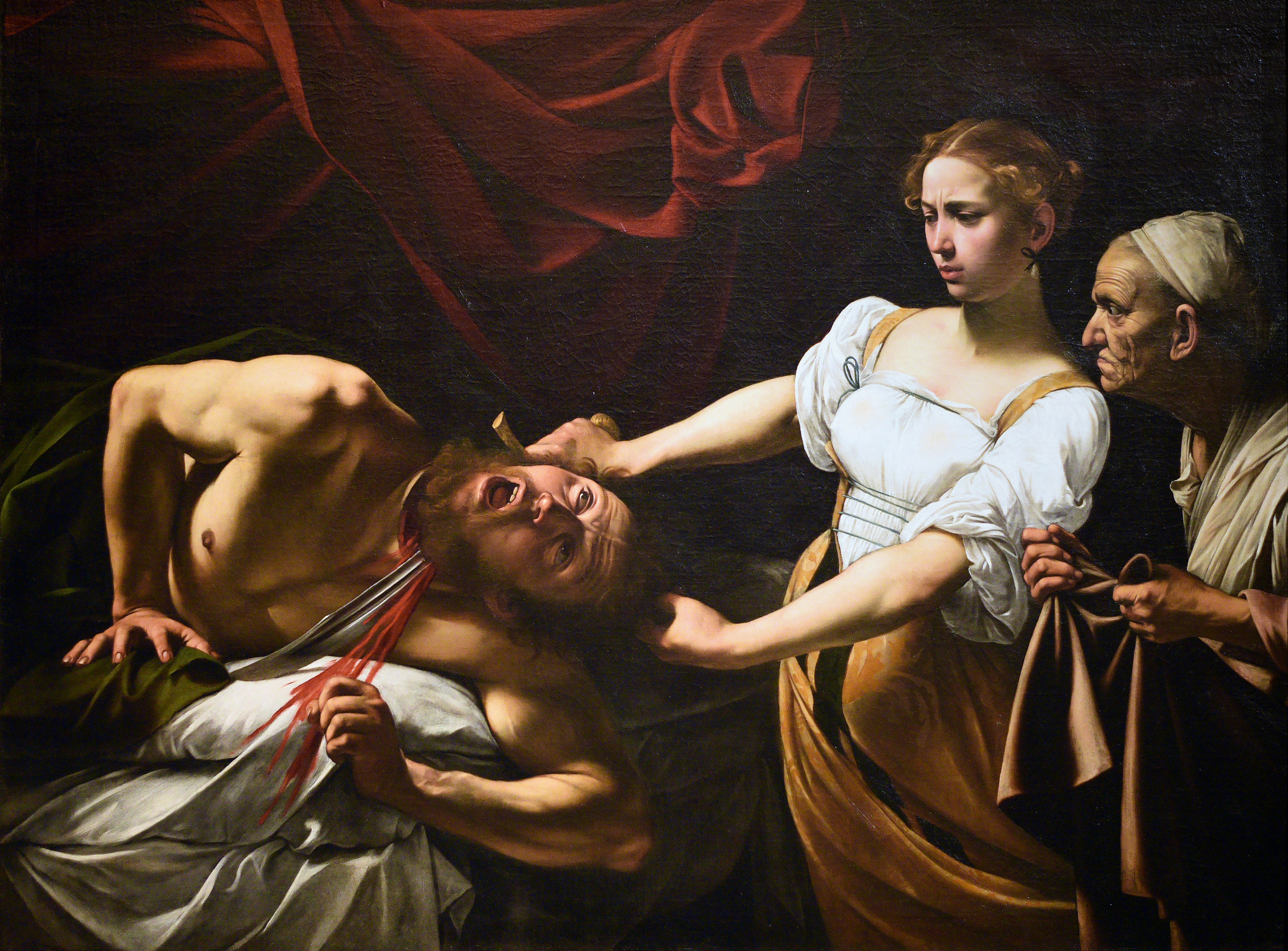
Moritz Schlick was shot and killed on the steps of the university library in Vienna by a student whose thesis he had failed.
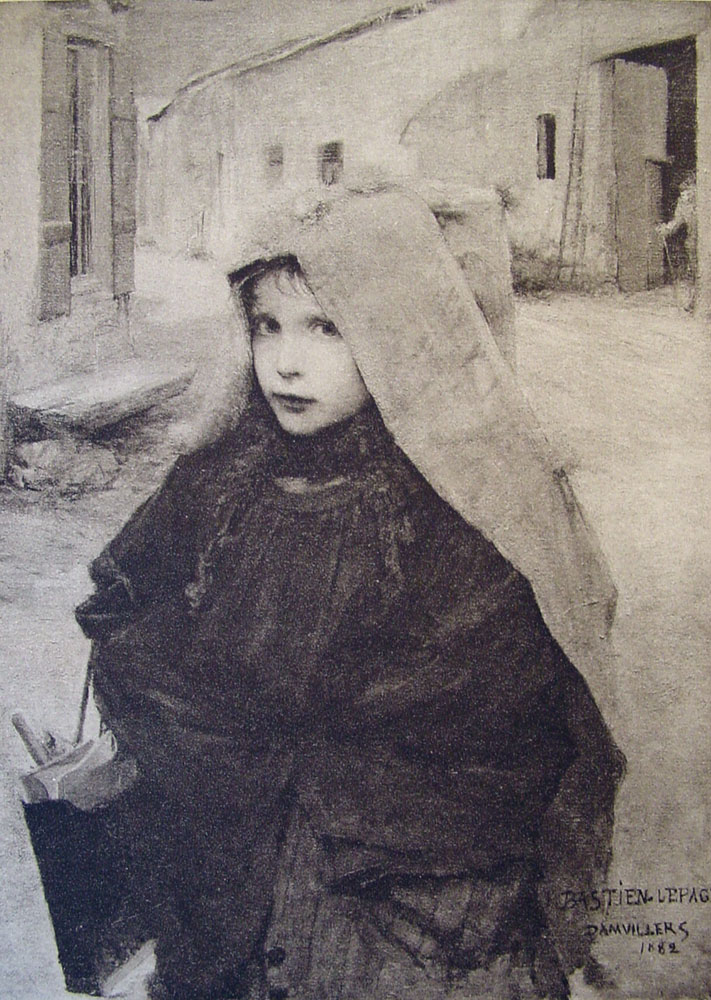
If indeed three or four years, will Protagonist have at least begun to become accustomed to the solitude? Accustomed, or wearily acquiescent, does Reader mean?
When Queen Christina of Sweden hired Descartes as a personal philosophy tutor in 1649, she dispatched a warship under a full admiral to convey him to Stockholm. But then demanded daily instruction at 5 A.M. in the Scandinavian winter. Descartes caught pneumonia and died.
gnōmōn, literally: “one that knows or examines”
Go tell the Spartans, stranger passing by,
that here, obedient to their laws, we lie.
Steven Pressfield, in Gates of Fire
James George Grazer: The Golden Bough, mythology, etc.
Arthur Koestler committed suicide with his wife Cynthia. The notes:
To whom it may concern.
The purpose of this note is to make it unmistakably clear that I intend to commit suicide by taking an overdose of drugs without the knowledge or aid of any other person. The drugs have been legally obtained and hoarded over a considerable period.
Trying to commit suicide is a gamble the outcome of which will be known to the gambler only if the attempt fails, but not if it succeeds. Should this attempt fail and I survive it in a physically or mentally impaired state, in which I can no longer control what is done to me, or communicate my wishes, I hereby request that I be allowed to die in my own home and not be resuscitated or kept alive by artificial means. I further request that my wife, or a physician, or any friend present, should invoke habeas corpus against any attempt to remove me forcibly from my house to hospital.
My reasons for deciding to put an end to my life are simple and compelling: Parkinson’s disease and the slow-killing variety of leukaemia (CCI). I kept the latter a secret even from intimate friends to save them distress. After a more or less steady physical decline over the last years, the process has now reached an acute state with added complications which make it advisable to seek self-deliverance now, before I become incapable of making the necessary arrangements.
I wish my friends to know that I am leaving their company in a peaceful frame of mind, with some timid hopes for a de-personalised after-life beyond due confines of space, time and matter and beyond the limits of our comprehension. This “oceanic feeling” has often sustained me at difficult moments, and does so now, while I am writing this.
What makes it nevertheless hard to take this final step is the reflection of the pain it is bound to inflict on my surviving friends, above all my wife Cynthia. It is to her that I owe the relative peace and happiness that I enjoyed in the last period of my life – and never before.
Since the above was written in June 1982, my wife decided that after thirty-four years of working together she could not face life after my death.
Cynthias notes:
I fear both death and the act of dying that lies ahead of us. I should have liked to finish my account of working for Arthur – a story which began when our paths happened to cross in 1949. However, I cannot live without Arthur, despite certain inner resources.
Double suicide has never appealed to me, but now Arthur’s incurable diseases have reached a stage where there is nothing else to do.
Nirvana means without wind, or blown out. In the sense that desire no longer exists.
Abstract Expressionism was invented by New York drunks.
Ombra mai fur: Never was a shade
Incitatus: swift (horse name)
Pages read and read, who has passed here before me
Prud’hon’s wife died and Mayer had expected that she would marry him. Prone to depression throughout her life, this prompted a crisis in Mayer’s life, “when Prud’hon refused to acknowledge her assistance and marry her after the many years she had served as his assistant and his housekeeper”, she then seized “the artist’s razor, drew it across her throat.”
There is no there there.
There is no now now.
“Là ci darem la mano” (Italian for “There we will give each other our hands”
George Eastman who founded Kodak, committed suicide, writing a note: “To my friends: my work is done. Why wait?”
Now I know you. No field, no home, no wife, no woman-no friends, no love.
Jacques Louis David was repeatedly drawn to sketch prisoners being led to the guillotine.
Dear me, I am about to become a god.
Doch das Sein- was ist das Sein?: but be that - what is that to be?
Even in the solemn moments of the mass, when prayer should be the purest… when I should groan for what I have done, I sigh for what I have lost.
Harry Crosby shot himself in the head. After first shooting the young married woman with whom he was having an affair.
Eliot, as an editor, rejected Animal Farm.
dormoir nonchalamment a l’ombre de ses seins: sleeping casually in the shade of her breasts
There is no mention of Achilles’ heel in Homer. In fact there is no mention of it by anyone until Statius, in Latin, nine hundred years later.
William Blake’s Europe Supported by Africa and America
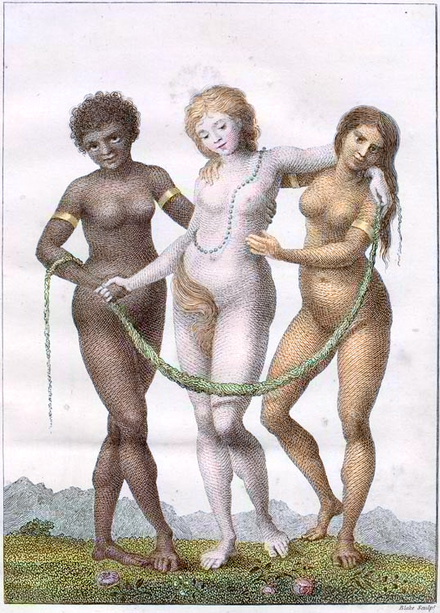
El Greco had to sue the Toledo Cathedral to be paid for his Disrobing of Christ. Which the Cathedral had commissioned.
Ōdī et amō: I hate and I love
Alan Turing committed suicide.
This sentence is a lie.
Louis Althusser spent four years in a psychiatric hospital after strangling his wife.
Hapax legomenon is a word or an expression that occurs only once within a context: either in the written record of an entire language, in the works of an author, or in a single text.
John Kennedy Toole committed suicide by running a hose from his exhaust pipe into his car.
Like Socrates, Aristotle was charged with impiety late in life. But went into exile rather than stand trial. Refusing to allow Athens to sin twice against philosophy, being how he put it.
Assia Wevill, for whom Ted Hughes left Sylvia Plath, committed suicide the same way Plath did. With the difference that she gassed the child she had had by Hughes a well.
In Book XVI of the Iliad, Apollo wrenches off Petroclus’s armor, leading to the latter’s death. Little more than two hundred lines later, Hector is shown stripping the same armor from Petroclus’s corpse.
It is only the man whose intellect is clouded by his sexual impulses who could give the name of the afir sex to that under-sized, narrow-shouldered, nbroad-hipped and short-legged race. Said Schopenhauer.
There is no such thing as a good painting about nothing. Said Mark Rothko.
Tulsidas was born into a family of beggars, and abandoned. And said that as a boy he sometimes lived on scraps thrown to dogs.
Ite, missa est: go, the dismissal is made
You care for nothing but shooting, dogs, and rat-catching, and you will be a disgrace to yourself and all your family. Said Charles Darwin’s father.
Du mußt dein Leben ändern: you must change your life
Virginia Hill was an American organized crime figure.
Lord, don’t help us. But don’t muck it up for us either.
O lente, lente currite, noctis equi!
O Slowly, Slowly, Run Horses of the Night)
-Marlowe’s Dr Faustus Act V Sc 2
Melville and Whitman were born within two months of each othera nd died within six. And were in close proximity in or near New York through much of their lives. Never meeting.
The Sleep of Reason Produces Monsters (Spanish: El sueño de la razón produce monstruos)
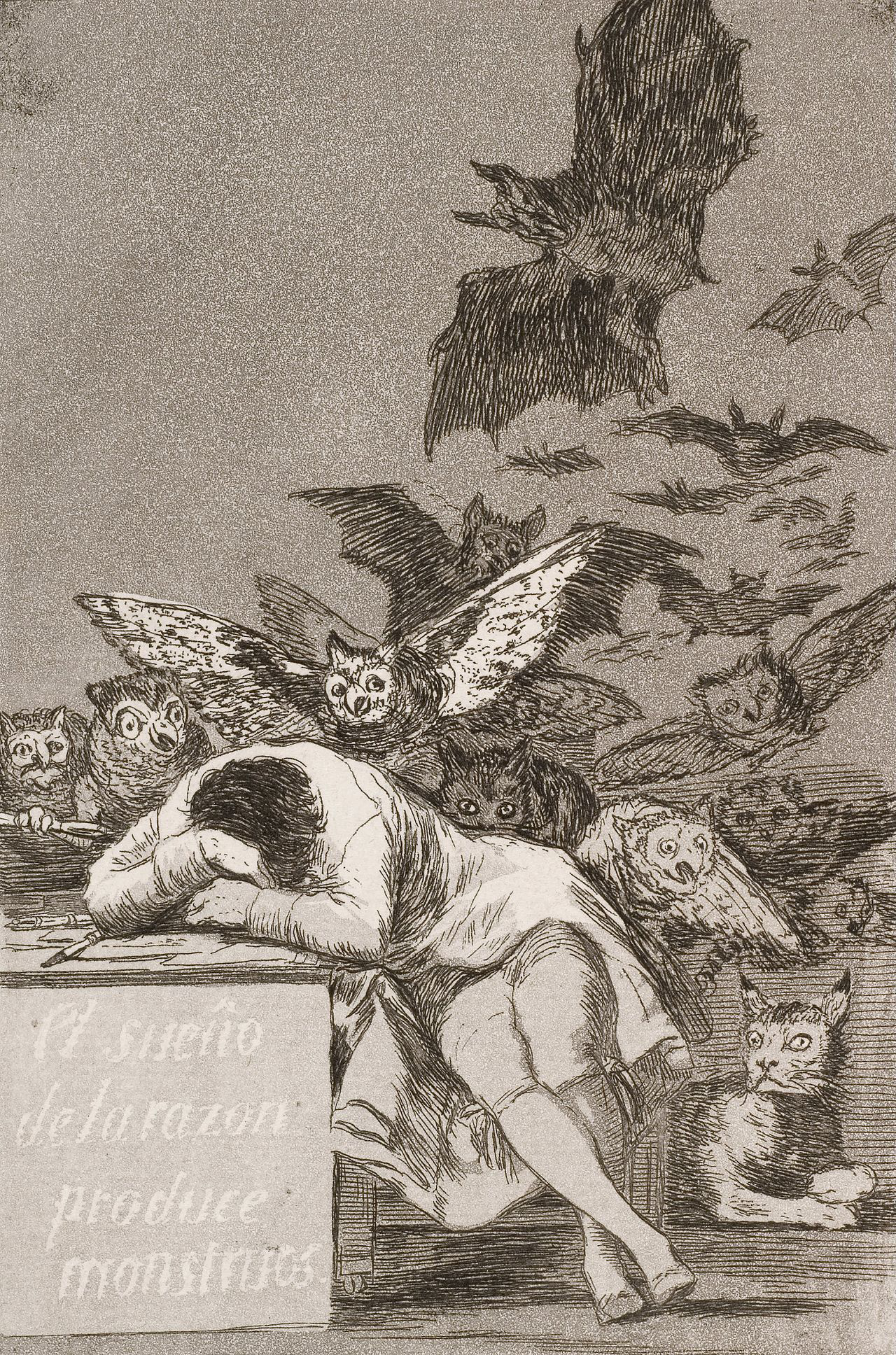
Ilse Koch, also known as The Witch of Buchenwald.
Dear Sir,
I [am in a Madhouse and] quite forget your Name
or who you are You must excuse me [for] I have nothing
to commu(n)icate [or tell of] and why I am shut up
[I dont know] I have nothing [to say so] I conclude.
[Yours respectfully,]
John Clare (To James Hipkins, 1860)
Though Dante claims to have seen Beatrice no more than twice himself. While immortalizing her even more extraordinarily.
Conrad Aiken’s father shot his wife and then himself. Leaving it to Aiken, at eleven, to climb a flight of stairs after hearing the shots and walk in on the bodies.
“Der Tod und das Mädchen”, “Death and the Maiden”
Long live the weeds and the wilderness yet.
It is impossible for man’s happiness to be in this world. Said Aquinas.
L’Origine du monde (The Origin of the World)
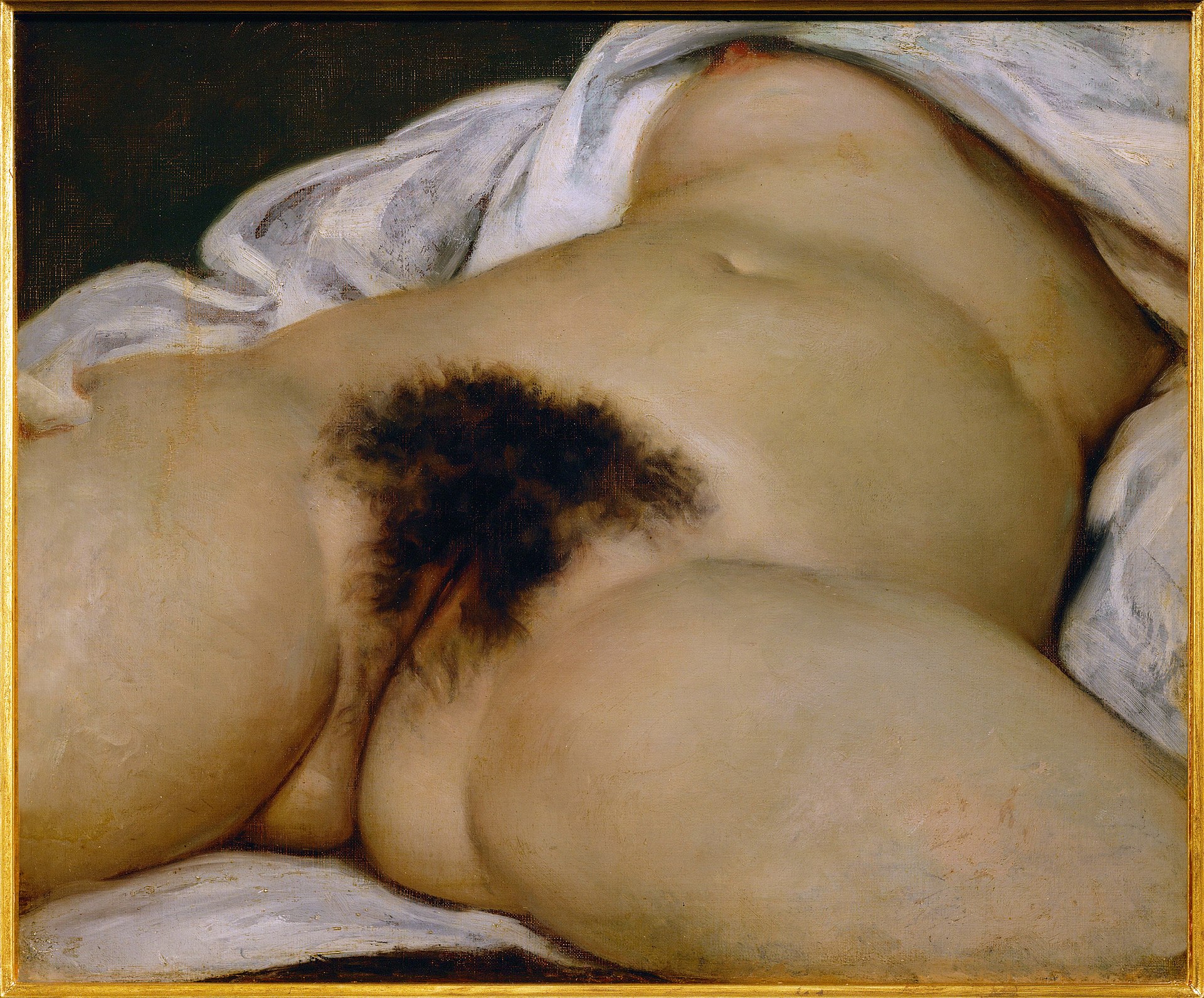
Pietro Torrigiano took a hammer to a Madonna he had sculpted in Seville when he was not paid what he anticipated. And was jailed by the Inquisition for sacrilege.
By Grand Canal Station I Sat Down and Wept
In a lawsuit that prevented him from teaching in New York in 1940, Bertrand Russell’s writings were described as lecherous, libidinous, lustful, venerous, erotomaniac, aphrodisiac, irreverent, narrow-minded, untruthful, and bereft of moral fiber. Unquote.
Vachel_Lindsay founder of singing poetry committed suicide.
Why do you always wear black?
I am in mourning for my life. -Anton Chekhov
ipse dixit: he said
The first edition of Thus Spoke Zarathustra sold forty copies. Nietzsche had had to pay for publication.
I had been only a mediocre caretaker of most of the things left in my hands, even of my talent, Scott Fitzgerald said.
That nearby, Protagonist awakening mornings to the wash of the surf?</br>
Mitigating, will it, the mornings recollection of the emptiness of the day before?
Its anticipation of the emptiness of the day to come?
was willst du, fremder Mensch: what do you want, stranger
Les Nuits d’Été: the summer nights
I am old, and can no longer work, and am without means of livelihood, and my wife is ill. Said Paolo Uccello on a tax declaration in Florence in 1469.
un grand peut-être: a grand maybe
Cavafy, acknowledged as the great Greek poet of his time. Who lived his entire writing life in Egypt.
o che dolce cosa é questa prospettiva: or what a sweet thing this prospect is
potestas clavium: the power of the keys
Y la vida no es noble, ni buena, ni sagrada: And life is not noble, nor good, nor sacred
A Christ of our neighbourhood, Ortega called Don Quixote.
Did Jesus ever laugh?
But I was desolate and sick of an old passion
Shakespeare’s mother and father were illiterate. And only one of his two daughters, Susanna, could sign her name. The other, Judith, made a mark.
Did it ever, once, enter even Protagonist’s bleakest conjecturings that he would finish out his life alone?
No survivor could ever recall having ever seen a single bird flying near any of the Nazi death camps.
Toward what final grievous contemplation amid the disarray?
In the end one experiences only one’s self. Said Nietzsche.
Nonlinear. Discontinuous. Collage-like. An assemblage.
Wastebasket.
“Thinking can hurt your chances, and I want to last”. From the Handmaid’s Tale
Sheet 29 (Blatt 29), Oskar Fischer, 1919
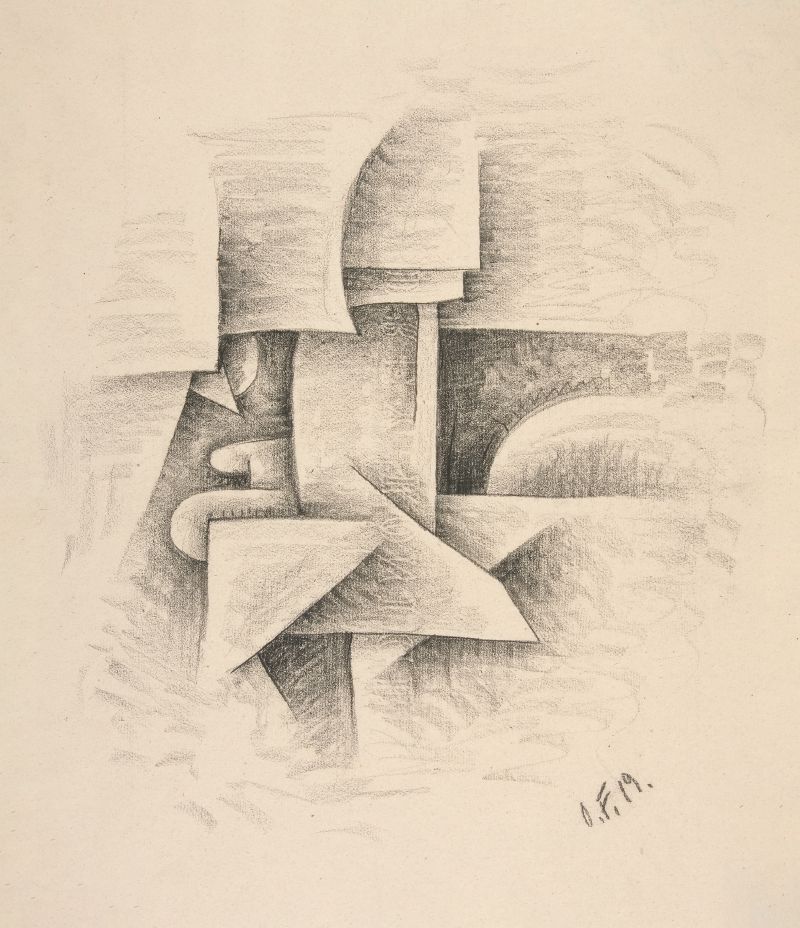
Dance of Death; Death Awed (1919)
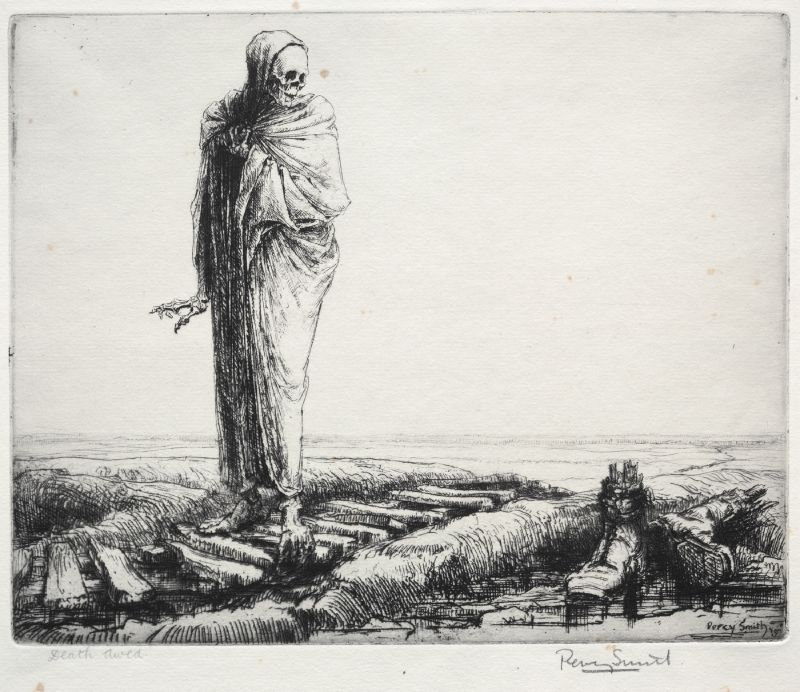
L’avertissement (1900), Albert Besnard
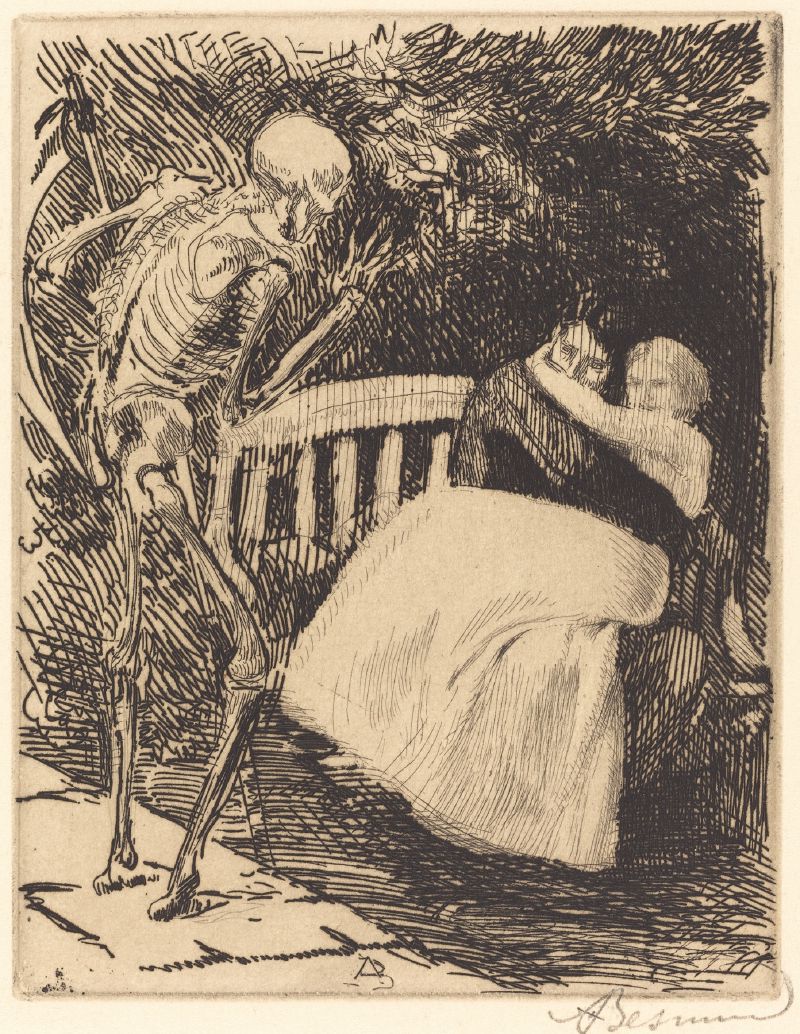
More and more he went running to the public house. But it was no longer to be among men, it was to get drunk. One might imagine him sitting there thinking those slow thoughts without words. One might predict that the day would come when we would realise very suddenly, very clearly, all that he had been thinking about, and, when this urgent, terrible thought had been translated into its own terms of action, he would be quietly hanged by the neck until he was as dead as he had been before he was alive.
- The Blind Man, James Stephens
The familiar saying that the exception proves the rule contains a good deal of wisdom, though from the standpoint of formal logic it became an absurdity as soon as “prove” no longer meant “put on trial.” The old saw began to be profound psychology from the time it ceased to have standing in logic. What it might well suggest to us today is that, if a rule has absolutely no exceptions, it is not recognized as a rule or as anything else; it is then part of the background of experience of which we tend to remain unconscious. Never having experienced anything in contrast to it, we cannot isolate it and formulate it as a rule until we so enlarge our experience and expand our base of reference that we encounter an interruption of its regularity. The situation is somewhat analogous to that of not missing the water till the well runs dry, or not realizing that we need air till we are choking.
The Human Condition (Magritte)
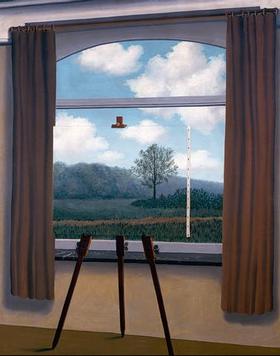
Magritte had this to say of his 1933 work:
In front of a window seen from inside a room, I placed a painting representing exactly that portion of the landscape covered by the painting. Thus, the tree in the picture hid the tree behind it, outside the room. For the spectator, it was both inside the room within the painting and outside in the real landscape.
This is why you don’t read reliable science from newspapers and magazines, let alone DO science based on them!
Pullum - The great Eskimo vocabulary hoax 1989.pdf
.jpg)
“Think about it. We have all had the experience of uttering or writing a sentence, then stopping and realising that it wasn’t exactly what we meant to say. To have that feeling, there has to be a ‘what we meant to say’ that is different from what we said” - Pinker, The Language Instinct
Regarding emotions and hype of a relationship / love:
They pour water on the fire, now the fire that was easy to create is now muddled with water.
Paraffin puts a fire out if poured too fast, but otherwise burns with the fire if done slowly
“I find my own fun,” said Justin, “I’m torn, here, by every single pang of annihilation. But that’s what I look for, that’s what I want completed; that’s the whole of what I want to embrace. On the far side of the nothing–my new form. Scrap ‘me’; scrap my wretched identity and you’ll bring to the open some bud of life. I not ‘I’-I’d be the world … You’re right: what you would call thinking does get me rattled. I only what you call think to excite myself. Take myself away, and I’d think. I might see; I might feel purely; I might even love-“
The blood of the world is poisoned, feels Aunt Fran, with her forehead over the eiderdown. Not a pure drop comes out at any prick-yes, even the heroes shed black blood. The solitary watcher retreats step by step from his post–who shall stem the black tide coming in? There are no more children: the children are born knowing. The shadow rises up the cathedral tower, up the side of the pure hill. There is not even the past: our memo- ries share with us the infected zone; not a memory does not lead up to this. Each moment is everywhere, it holds the war in its crystal; there is no elsewhere, no other place. Not a benedic- tion falls on this apart house of the Major; the enemy is within it, creeping about. Each heart here falls to the enemy.
Excerpts from Existential Psychotherapy by Irvin D. Yalom:
Imagine a happy group of morons who are engaged in work. They are carrying bricks in an open field. As soon as they have stacked all the bricks at one end of the field, they proceed to transport them to the opposite end. This continues without stop and everyday of every year they are busy doing the same thing. One day one of the morons stops long enough to ask himself what he is doing. He wonders what purpose there is in carrying the bricks. And from that instant on he is not quite as content with his occupation as he had been before. I am the moron who wonders why he is carrying the bricks.
Try to understand I want to be a man who belongs to someplace, a man among comrades. Only consider. Even the slave bent beneath his load dropping with fatigue and staring dully at the ground and foot in front of him-why even that poor slave can say that he’s in his town as a tree is in a forest or a leaf upon a tree. Argos is all around him, warm, compact, and comforting. Yes, Electra, I’d gladly be that slave and enjoy that feeling of drawing the city round me like a blanket and curling myself up in it.
What a change has come on everything … until now I felt something warm and living round me, like a friendly presence. That something has just died. What emptiness. What endless emptiness.
I say there is another path–my path. Can’t you see it. It starts here and leads down to the city. I must go down into the depths among you. For you are living all of you at the bottom of a pit … Wait. Give me time to say farewell to all the lightness, the aery lightness that was mine… Come, Electra look at our city… It fends me off with its high walls, ted roofs, locked doors. And yet it’s mine for the taking. I’ll turn into an ax and hew those walls asunder..
Suddenly, out of the blue, freedom crashed down on me and swept me off my feet. My youth went with the wind, and I know myself alone and there was nothing left in heaven, no right or wrong, nor anyone to give me orders… I am doomed to have no law but mine … Every man must find his own way.
Toward ourselves. Beyond the river and mountains are an Orestes and an Electra waiting for us, and we must make our patient way towards them.
Whether that be so or not, it would be well for man to behave as if it were so - Thomas Mann
Join a whole, work for it with all your body and mind. The meaning of life lies in the chance it gives us to produce, or to contribute to something greater than ourselves. It need not be a family (although that is the direct and broadest road which nature in her blind wisdom has provided for even the simplest soul); it can be any group that can call out all the latent nobility of the individual, and give him a cause to work for that shall not be shattered by his death.
The dangers of a nontranscendent posture are particularly evident in interpersonal relationships. The more one focuses on oneself, for example, in sexual relationships, the less is one’s ultimate satisfaction. If one watches oneself, is concerned primarily with one’s own arousal and release, one is likely to suffer sexual dysfunction. Frankl-quite correctly, I believe–feels that the contemporary idealization of “self-expression” often, if made an end in itself, makes meaningful relationships impossible. The basic stuff of a loving relationship is not free self-expression (although that may be an important ingredient) but reaching outside of oneself and caring for the being of the other.
Three Categories of Life Meaning. Though Frankl stresses that each in- dividual has a meaning that no one else can fulfill, these unique mean- ings fall into three general categories: (1) what one accomplishes or gives to the world in terms of one’s creations; (2) what one takes from the world in terms of encounters and experiences; (3) one’s stand toward suffering, toward a fate that one cannot change.32
ugly beautiful: belle laide
If you mean the menopause, Madame Keel is much too young for that. She means emotional cycles. Elation-depression. Vitality-debility. Exultation-despair. The usual manic- depressive syndrome. She says that ever since she came to Ireland she has been melancholy.
Jaysus! Sure, aren’t we all melancholy in Ireland? What r’d say that one needs is a few good balls of malt every day or a dose or two of cod liver oil. If I were you, Frank, I’d pack her off about her business.
Buckley–there is no denying it- had a point when he insisted that man’s most ingenious invention is man, that to create others we must first imagine ourselves, and that to keep us from wandering, or wondering, in some other direction where a greater truth may lie, we set up all sorts of roadblocks and traffic signals.
“Don’t kill it!” Mother would cry if we raised a hand to an angry wasp. “Just catch it, dear, and put it outside. Open the window and let it fy away! But even this treatment could at times be deemed too harsh. “Wait a minute. Close the window!” she’d cry. “It’s too cold outside. It will die. That’s why it came in, I suppose! Oh dear, what will we do? Life would be going full blast again.
since there is no harm: puisqu’il n’y a pas de mal.
der mensch muss hinaus in’s feindliche leben. muss wirken und streben: the human has to live in a hostile environment. must work and strive
They called me mad, and I called them mad, and damn them, they outvoted me // Nathaniel Lee
Timor mortis conturbat me is a Latin phrase commonly found in late medieval Scottish and English poetry, translating to “fear of death disturbs me”
Quare caper: So it means life is a rum business, a sequence of strange events, a quare caper.
Coincidentia oppositorum: coincidence of opposites
Et les extremes se touchent: the extremes meet
modus vivendi: way of life
Excerpts from Total Fears: Letters to Dubenka:
It’s like what happened to my mother, who, according to her death certificate, died of softening of the brain but I’ve attained such an absolute peak of emptiness and I’m so, so alone, effectively in solitary confinement, tied up in a straitjacket, no longer living in time, but only and exclusively in space, which shocks and horrifies me…
So anyway, Dubenka, I reckon, when a good person dies, to be rewarded in heaven, the soul is transformed into a dove, like the Holy Spirit descending as a dove upon the Virgin Mary or the Apostles at the time of Pentecost. And when I saw those thousands and thousands of dead pigeons and doves in the Budeé rotunda, for me one of those doves was my wife Pipsi, who was so long dying that in the end she became a saint… I remember how back in Kersko, three days before she asked me to take her to the Bulovka Hospital, she suddenly asked me to go up to our “signal box”, to the veranda, and fetch a particular number of World Literature .. I felt anxious … Where was I to look? But she said to me softly .. It’s lying up there, I was reading it only yesterday, there are planks and boards on the cover, as if they were making a scaffold for the front page … but ah . .. Three days before Gary Cooper died of cancer, he asked for a silver cross and then just to be left in peace… My Pipsi died on the third day too … those last days of her life, when she looked at me only twice, never before had I seen her so beautiful, so youthful, so full of Heaven and sky … And twice in that time, maybe only twice during our whole life together she said to me quietly, beautifully … Thank you, Bohousku… Thank you, Bohousku… My little dove flew up from the rock…
So we’ll visit this Dievikov monastery, Dubenka, and we’ll bow to Vysotsky who, when his wife took him to Hollywood, was introduced with her in the film club as “Mrs Vlady accompanied by her husband» whereas by the time they left the Hollywood restaurant, and Vysotsky had borrowed a guitar and played and sung for two hours, it was “Vladimir Vysotsky accompanied by his wife”.. We’ll bow to Yesenin, who shot himself, and hung himself too, to make quite sure, in the Hotel Angleterre.
I’ll leave my native soil behind, unable to overcome my sad sorrow, become instead a wandering vagabond. Through the countryside I’ll roam, looking for the simple life, till one day a friend pulls from his boot a knife … Through the countryside I’ll walk alone, seeking for a gently warming sun – the one whose name I say o’er and o’er, she will drive me from the door ..
The Magic Flute
Sometimes when I get up and emerge from the mists of slumber, my whole room hurts, my whole bedroom, the view from the window hurts, kids go to school, people go shopping, everybody knows where to go, only I don’t know where I want to go, I get dressed, blearily, stumbling, hopping about to pull on my trousers, I go and shave with my electric razor – for years now, whenever I shave, I’ve avoided looking at myself in the mirror, I shave in the dark or round the corner, sitting on a chair in the passage, with the socket in the bathroom, I don’t like looking at myself any more, I’m scared by my own face in the bathroom, I’m hurt even by my own appearance, I see yesterday’s drunkenness in my eyes, I don’t even have breakfast any more, or if I do, only coffee and a cigarette, I sit at the table, sometimes my hands give way under me and several times I repeat to myself, Hrabal, Hrabal, Bohumil Hrabal, you’ve victoried yourself away, you’ve reached the peak of emptiness, as my Lao Tzu taught me, I’ve reached the peak of emptiness and everything hurts, even the walk to the bus-stop hurts, and the whole bus hurts as well, I lower my guilty-looking eyes, I’m afraid of looking people in the eye, sometimes I cross my palms and extend my wrists, I hold out my hands so that people can arrest me and hand me over to the cops, because I feel guilty even about this once too loud a solitude which isn’t loud any longer, because I’m hurt not only by the escalator which takes me down to the infernal regions below, I’m hurt even by the looks of the people travelling up, each o them has somewhere to go, while I’ve reached the peak of emptiness and don’t know where I want to go.
I know, but in the end I’m saved by those children of mine, the little cats in the woods, who are waiting for me, they’re my children, so I take the metro, but now even the metro hurts, people go up, while others, and I with them, go down, we stand in our places, going down the escalator, then up the stairs I go again, and there in the little buffet I guiltily buy four grilled chicken breasts, and guiltily I pay, watching my hands tremble, because I’m buying chicken for the cats, while out there somewhere in Africa children starve. Even that little buffet hurts, and the busy street, with its trucks and private cars criss-crossing in opposite directions, every driver knows where to go, I’m the only one who doesn’t, even if out there somewhere in the woods my last hopes are there waiting for me, the last reason to live, my little cats, petrified, in case I never come, what would become of them, who would feed them, who would stroke them, because they love me, those kitties, whereas I’m hurt now, not just by my own little bedroom, I’m hurt by this whole town in which I live, I’m hurt by this whole world, because towards morning certain beings come to me - beings not unfamiliar to me, on the contrary, they come slowly but surely up the escalator of my soul, and not only their faces come into focus, but also certain horrible events, just like a portrait, or a film, a documentary not only about how I was ever madly in love, but also how I failed people. So that interior monologue continues, no, I’m no longer talking alone with myself; but it’s as if I’m up before an interrogating judge, everything I ever said, everything I ever did, everything is always against me, from this time on whatever I’ve been made to think about has been against me. How many times I’ve crossed the road at the red, how many times I’ve walked through the stream of traffic, but in spite of being lost in thought, I am accompanied always by my guardian angel, my little guardian angel, because this guardian angel of mine wants me to remain in this world as yet, in order to reach the final bottom, to go down yet one more flight, to the place of the ultimate pit of remorse, because the whole world hurts, and even that guardian angel of mine hurts, how many times I’ve felt like jumping from the fifth floor, from my apartment where every room hurts, but always at the last moment my guardian angel saves me, he pulls me back, just like my Herr Doktor Franz Kafka, who wanted to jump from the fifth floor, from the Maison Oppelt, which you enter from the Old Town Square, but the Herr Doctor would have fallen into Parízská, into Paris Avenue, he too was hurt by the world, I suppose, and hurt by his life, just like Malte Laurids Brigge, who also wanted to jump from the fifth floor, he was hurt too by the world in Paris. Brigge was hurt by the whole world as well, just like Rainer Maria Rilke. I’ve victoried myself away, I’ve reached the peak of emptiness.
‘All that’s nonsense,’ he said hopefully, ‘and there is nothing in it all to worry about! It’s simply physical derangement. Just a glass of beer, a piece of dry bread - and in one moment the brain is stronger, the mind is clearer and the will is firm! Phew, how utterly petty it all is!’
Do you know, sir, do you know, I have sold her very stockings for drink? Not her shoes - that would be more or less in the order of things, but her stockings, her stockings I have sold for drink! Her mohair shawl I sold for drink, a present to her long ago, her own property, not mine; and we live in a cold room and she caught cold this winter and has begun coughing and spitting blood too. We have three little children and Katerina Ivanovna is at work from morning till night; she is scrubbing and cleaning and washing the children, for she’s been used to cleanliness from a child. But her chest is weak and she has a tendency to consumption and I feel it! Do you suppose I don’t feel it? And the more I drink the more I feel it. That’s why I drink too. I try to find sympathy and feeling in drink … I drink so that I may suffer twice as much!’ And as though in despair he laid his head down on the table.
Arabic Lullaby
دلول دلول یا ولد یا ابنی دلول
عدوک علیل و ساکن الچول
یا الولد یما الولد یما الولد
للکبر نریده المچیده
لیشیل المحامل و طریده
فرگه الولد فرگه مچیده
یما یا الولد یا غالی الثمان
یا الولد یما الولد یسما الولد یما الولد
نص اللیل حد بالنوم فزه
یما عدالی بحضنی
لیت الزه
Daloul daloul! The boy, my son, daloul! (1)
Your enemy is weak and lives in the desert (2)
The boy, mommy! The boy, the boy, mommy! The boy,
We want him for our old age, for the time of hardship
For carrying loads and the hunted meat (3).
Separation from the son is a very sad separation.
Mommy! The boy, my dear child,
In the mid night somebody has awoken him.
Mommy! Though he is in my arms,
I wish I could chase that person away.
(1) Daloul in the local Arabic dialect means “my lovely”, “my sweetheart” or
“fondness”.
(2) A very far unreachable flat place.
(3) Hunted animals.
https://www.mamalisa.com/?t=ec&c=67
Arabic:
بلیل جستنی الحنینه
و ادموعها ایبخن الچیمه
امی الضمد و اخوی شیمه
اوصیچ یا شمس المسیتی
الوالده عیدی وصیتی
انه غریبه و طرف بیتی
Persian:
شب آن بانوی مهربان به دیدنم آمد
و اشکهایش بر کانون آتش میریخت
مادرم، مونس است و برادرم، عزت و افتخار
ای خورشیدی که غروب کردهای
پیغامم را برای مادرم ببر
که من غریبم و خانهام دور
English:
At night, that kind lady came to visit me,
Her teardrops were falling into the fireplace,
My mother is my companion and my brother, my esteem and honor
O’ sun you have set,
Take this message to my mother:
I am estranged and my home is far
On marriage:
We excerpted “The Irrational Season” for ours:
But ultimately there comes a moment when a decision must be made. Ultimately two people who love each other must ask themselves how much they hope for as their love grows and deepens, and how much risk they are willing to take…
It is indeed a fearful gamble…Because it is the nature of love to create, a marriage itself is something which has to be created, so that, together we become a new creature.
To marry is the biggest risk in human relations that a person can take
If we commit ourselves to one person for life this is not, as many people think, a rejection of freedom; rather it demands the courage to move into all the risks of freedom, and the risk of love which is permanent; into that love which is not possession, but participation…
It takes a lifetime to learn another person…When love is not possession, but participation, then it is part of that co-creation which is our human calling, and which implies such risk that it is often rejected.
“When my husband died, because he was so famous and known for not being a believer, many people would come up to me-it still sometimes happens-and ask me if Carl changed at the end and converted to a belief in an afterlife. They also frequently ask me if I think I will see him again. Carl faced his death with unflagging courage and never sought refuge in illusions. The tragedy was that we knew we would never see each other again. I don’t ever expect to be reunited with Carl. But, the great thing is that when we were together, for nearly twenty years, we lived with a vivid appreciation of how brief and precious life is. We never trivialized the meaning of death by pretending it was anything other than a final parting. Every single moment that we were alive and we were together was miraculous- not miraculous in the sense of inexplicable or supernatural. We knew we were beneficiaries of chance… That pure chance could be so generous and so kind… That we could find each other, as Carl wrote so beautifully in Cosmos, you know, in the vastness of space and the immensity of time… That we could be together for twenty years. That is something which sustains me and it’s much more meaningful. … The way he treated me and the way I treated him, the way we took care of each other and our family, while he lived. That is so much more important than the idea I will see him someday. I don’t think I’ll ever see Carl again. But I saw him. We saw each other. We found each other in the cosmos, and that was wonderful.”
Death Speaks:
There was a merchant in Baghdad who sent his servant to market to buy provisions and in a little while the servant came back, white and trem- bling, and said, Master, just now when I was in the market-place I was jostled by a woman in the crowd and when I turned I saw it was Death that jostled me. She looked at me and made a threatening gesture; now, lend me your horse, and I will ride away from this city and avoid my fate. I will go to Samarra and there Death will not find me. The merchant lent him his horse, and the servant mounted it, and he dug his spurs in its flanks and as fast as the horse could gallop he went. Then the merchant went down to the market-place and he saw me standing in the crowd, and he came to me and said, why did you make a threatening gesture to my servant when you saw him this morning? That was not a threatening ges- ture, I said, it was only a start of surprise. I was astonished to see him in Baghdad, for I had an appointment with him tonight in Samarra.
W. Somerset Maugham
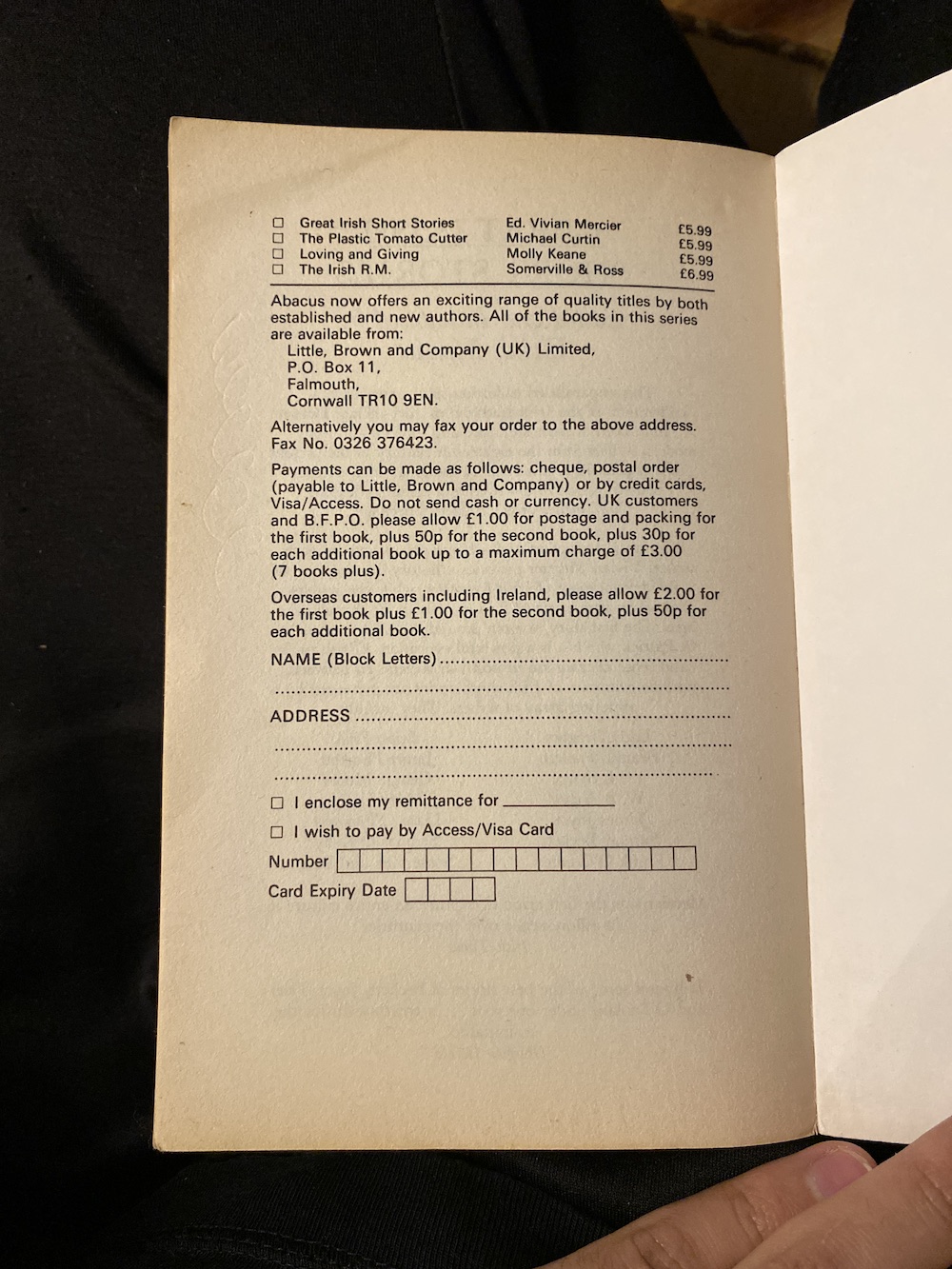
“Men did not make the earth. It is the value of the improvements only, and not the earth itself, that is individual property. Every proprietor owes to the community a ground rent for the land which he holds” — Thomas Paine, Agrarian Justice, 1797
Geometria et Perspectiva Pl 03 (1567) Lorenz Stoer
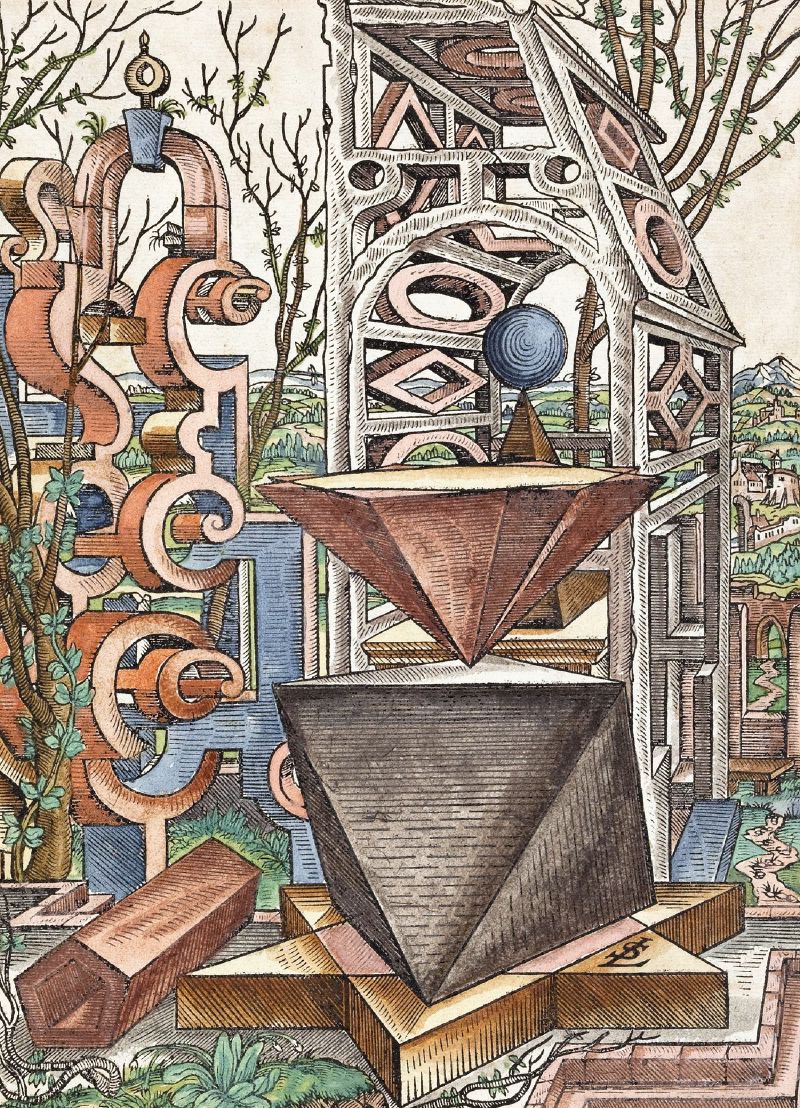
Maquettes de Theatre 4 (1930) Alexandra Exter

Theocles, proposes that the best candidate for the constant good that they are seeking is genuine friendship, which he understands as love of humanity. HEAR then! said THEOCLES. For tho I pretend not to tell you at once the Nature of this which I call GOOD; yet I am content to shew you something of it, in your-self, which you will acknowledg to be naturally more fix’d and constant, than any thing you have hitherto thought on. Tell me, my Friend! if ever you were weary of doing good to those you lov’d? Say when you ever found it unpleasing to serve a Friend Or whether when you first prov’d this generous Pleasure, you did not feel it less than at this present; after so long Experience? Believe me, PHILOCLES, this Pleasure is more debauching than any other. Never did any Soul do good, but it came readier to do the same again, with more Enjoyment. Never was Love, or Gratitude, orA Bounty practis’d but with increasing Joy, which made the Practiser still more in love with the fair Act. Answer me, PHILOCLES, you who are such a Judg of Beauty, and have so good a Taste of Pleasure; is there any thing you admire, so fair as Friendship? or any thing so charming as a generous Action? What wou’d it be therefore, if all Life were in reality but one continu’d Friendship, and cou’d be made one such intire Act? Here surely wou’d be that fix’d and constant GOOD you sought. Or wou’d you look for any thing beyond? (The Moralists, II.1, 2:135) Philocles has self-doubts whether he is capable of love of humanity in the abstract sense proposed by Theocles. I told THEOCLES, going along, that I fear’d I shou’d never make a good Friend or Lover after his way. As for a plain natural Love of one single Person in either Sex, I cou’d compass it, I thought, well enough; but this complex universal sort was beyond my reach. I cou’d love the Individual, but not the Species. This was too mysterious; too metaphysical an Object for me. In short, I cou’d love nothing of which I had not some sensible material Image. (The Moralists, II.1,2:137)
Van Gogh
What would life be if we had no courage to attempt anything.
Unknown and uncelebrated during his lifetime, there was little demand for his work. He used some of his art as payment for bills. Van Gogh only managed to sell one painting while living.
Meanwhile his artworks have sold at prices as high as $82,500,000.
“It is good to love many things, for therein lies the true strength, and whosoever loves much performs much, and can accomplish much, and what is done in love is well done.”
I don’t know anything with certainty, but seeing the stars makes me dream.”
“The patient, though calm most of the time, has had several attacks during his stay in the establishment which lasted from two weeks to one month… between his attacks the patient was perfectly quiet and devoted himself with ardour to his painting.
On the day Van Gogh left the asylum, Peyron wrote a single word in the comments column: Recovery.”
On 27 July that same year, Vincent Van Gogh shot himself in the chest. He died two days later, in Auvers-sur-Oise.
I hold the knife. I just used it to scrap off some tape from my art prints so I could put them on the wall again, with new tape. I think of the possibilities. Imagine cutting myself and sitting silently, and calmly, considering that I will be bereft or anything at all in due time. I consider what happens tomorrow (although there will be no notion of tomorrow anymore, soon). What will the people who knew me think? Feel? Anyone feeling guilty? Responsible? Cause and effect? Knives look different now. So do bridges, high buildings. The custom house is my favourite, to make it absolutely clear to this place and its people. They will brushing it off as insanity or whatnot anyway. Or will they change? Very unlikely. Electric shock. Wall plug. Pills? Gun? Rope? I think I prefer the jump. Always loved parkour and skydiving and extreme sports. One last jump where I won’t have to be conscious of a need to open the parachute. One last, free jump. Take in the scenery. Liffey? Asphalt. Bam.
In the pale grass, under the vivid colors of the sky, the two gravediggers were lying on their backs, staring silently up at the heavens. The widow looked at them as she paused on the stile. Her thoughts of these men had been indifferent, subconscious up to this instant. They were handsome young men. Perhaps if there had been only one of them the widow would ahve been more attentive. The dark handsomeness did not seem the same thing when repeated. Their beauty, if one could call it beauty, had been collective, the beauty of flowers, of dark, velvety pansies, the distinctive marks of one faithfully duplicated on the other. The good looks of one had, to the mind of the widow, somehow nullified the good looks of the other. There was too much borrowing of Peter to pay Paul in their well-favored features. The first gravedigger spoiled the illusion of individuality in the second gravedigger. The widow had not thought so, but she would have agreed if anybody whispered to her that a good-looking man who wanted to win favor with a woman should never have so complete a twin brother. It would be possible for a woman to part tenderly with a man, and, if she met his iamge and likeness around the corner, knock him down. There is nothing more powerful, but nothing more delicate in life than the valves of individuality.
-The Weaver’s Grave, Seamas O’Kelly
بس که لبریزم از تو میخواهم
بروم در میان صحراها
سر بسایم به سنگ کوهستان
تن بکوبم به موج دریاها
آری آغاز دوست داشتن است
گرچه پایان راه ناپیداست
من به پایان دگر نیاندیشم
که همین دوست داشتن زیباست
I Know the Truth
I know the truth—give up all other truths!
No need for people anywhere on earth to struggle.
Look—it is evening, look, it is nearly night:
what do you speak of, poets, lovers, generals?
The wind is level now, the earth is wet with dew,
the storm of stars in the sky will turn to quiet.
And soon all of us will sleep under the earth, we
who never let each other sleep above it.
“I know the truth” Tsvetaeva (1915).
Trans. by Elaine Feinstein
I think that I shall never see
A poem lovely as a tree.
A tree whose hungry mouth is prest
Against the earth’s sweet flowing breast;
A tree that looks at God all day,
And lifts her leafy arms to pray;
A tree that may in Summer wear
A nest of robins in her hair;
Upon whose bosom snow has lain;
Who intimately lives with rain.
Poems are made by fools like me,
But only God can make a tree.
In Flanders fields the poppies blow
Between the crosses, row on row,
That mark our place; and in the sky
The larks, still bravely singing, fly
Scarce heard amid the guns below.
We are the Dead. Short days ago
We lived, felt dawn, saw sunset glow,
Loved and were loved, and now we lie
In Flanders fields.
Take up our quarrel with the foe:
To you from failing hands we throw
The torch; be yours to hold it high.
If ye break faith with us who die
We shall not sleep, though poppies grow
In Flanders fields.
Pieces from Sohrab Sepehri’s poems:
شبیه هیچ شده ای
خودت را به سردی خاک بسپار
این دشت آفتابی را شب کن
تا من، راه گمشده را پیدا کنم، و در جاپای خودم خاموش شوم
خاک آیینه کنید از اشک گرم چشمتان سیراب
دست های شب مه آلود است
ریشههای روشنایی میشکافد صخره شب را
ساقههای نور میرویند در تالاب تاریکی
..
روزگاری است در این گوشه پژمرده هوا
هر نشاطی مرده است.
..
با درون سوخته دارم سخن.
کی به پایان میرسد افسانهام؟
..
گرچه میسوزم از این آتش به جان،
لیک بر این سوختن دل بستهام.
تیرگی پا میکشد از بامها:
صبح میخندد به راه شهر من.
دود می خیزد هنوز از خلوتم.
با درون سوخته دارم سخن.
..
راه فرو بسته گرچه مرغ به آوا،
قالب خاموشی او صدایی گویاست.
میگذرد لحظهها به چشمش بیدار،
پیکر او لیک سایه-روشن رویاست.
..
تیرگی میآید.
دشت میگیرد آرام.
قصه رنگی روز
میرود رو به تمام.
شاخهها پژمرده است.
سنگها افسرده است.
رود مینالد.
جغد میخواند.
غم بیامیخته با رنگ غروب.
میتراود ز لبم قصه سرد:
دلم افسرده در این تنگ غروب.
..
غمی غمناک
شب سردی است، و من افسرده.
راه دوری است، و پایی خسته.
تیرگی هست و چراغی مرده.
میکنم، تنها، از جاده عبور:
دور ماندند ز من آدمها.
سایهای از سر دیوار گذشت،
غمی افزود مرا بر غمها.
فکر تاریکی و این ویرانی
بیخبر آمد تا با دل من
قصهها ساز کند پنهانی.
نیست رنگی که بگوید با من
اندکی صبر، سحر نزدیک است
هر دم این بانگ بر آرم از دل:
وای، این شب چقدر تاریک است.
خندهای کو که به دل انگیزم؟
قطرهای کو که به دریا ریزم؟
صخرهای کو که بدان آویزم؟
مثل این است که شب نمناک است.
دیگران را هم غم هست به دل،
غم من، لیک، غمی غمناک است.
..
خشت میافتد از این دیوار.
رنج بیهوده نگهبانش برد.
دست باید نرود سوی کلنگ،
سیل اگر آمد آسانش برد.
باد نمناک زمان میگذرد،
رنگ میریزد از پیکر ما.
خانه را نقش فساد است به سقف،
سر نگون خواهد شد بر سر ما.
..
دره خاموش سکوت، بند گسسته است.
کنار دره، درخت شکوه پیکر بیدی.
در آسمان شفق رنگ
عبور ابر سپیدی.
نسیم در رگ هر برگ میدود خاموش.
نشسته در پس هر صخره وحشتی به کمین.
کشیده از پس یک سنگ سوسماری سر.
ز خوف دره خاموش
نهفته جنبش پیکر.
به راه مینگرد سرد، خشک، تلخ، غمین.
چو مار روی تن کوهی میخزد راهی،
به راه، رهگذری.
خیال دره و تنهایی
دوانده در رگ او ترس.
کشیده چشم به هر گوشه نقش چشمه وهم:
ز هر شکاف تن کوه
خزیده بیرون ماری.
به خشم از پس هر سنگ
کشیده خنجر خاری.
غروب پر زده از کوه.
به چشم گم شده تصویر راه و راهگذر.
غمی بزرگ، پر از وهم
به صخره سار نشسته است.
درون دره تاریک
سکوت بند گسسته است.
دنگ... دنگ...، دنگ...
ساعت گیچ زمان در شب عمر
میزند پی در پی زنگ.
زهر این فکر که این دم گذر است
میشود نقش به دیوار رگ هستی من.
لحظهام پر شده از اذت
پا به زنگار غمی آلوده است.
لیک چون باید این دم گذرد،
پس اگر میگریم
گریه آم بیثمر است.
و اگر میخندم
خندهام بیهوده است.
دنگ...، دنگ...
لحظهها میگذرد.
آنچه بگذشت، نمیآید باز.
قصهای هست که هرگز دیگر
نتواند شد آغاز.
مثل این است که یک پرسش بیپاسخ
بر لب سرد زمان ماسیده است.
تند برمیخیزم
تا به دیوار همین لحظه که در آن همه چیز
رنگ اذت دارد، آویزم.
آنچه میماند از این جهد به جای:
خنده لحظه پنهان شده از چشمانم.
و آنچه بر پیکر او میماند:
نقش انگشتانم.
دنگ...
فرصتی از کف رفت.
قصهای گشت تمام.
لحظه باید پی لحظه گذرد
تا که جان گیرد در فکر دوام،
این دوامی که درون رگ من ریخته زهر،
وا رهانیده از اندیشه من رشته حال
وز رهی دور و دراز
داده پیوندم با فکر زوال.
پردهای میگذرد،
پردهای میآید:
میرود نقش پی نقش دگر،
رنگ میلغزد بر رنگ.
ساعت گیج زمان در شب عمر
میزند پر در پی زنگ:
دنگ...، دنگ...،
دنگ...
..
دریا و مرد
تنها، و روی ساحل،
مردی به راه میگذرد.
نزدیک پای او
دریا، همه صدا.
شب، گیج در تلاطم امواج.
باد هراس پیکر
رو میکند به ساحل و در چشمهای مرد
نقش خطر را پر رنگ میکند.
انگار
هی میزند که: مرد! کجا میروی، کجا؟
و مرد میرود به ره خویش.
و باد سرگردان
هی میزند دوباره: کجا میروی؟
و مرد میرود.
و باد همچنان...
امواج، بی امان،
از راه میرسند
لبریز از غرور تهاجم.
موجی پر از نهیب
ره میکشد به ساحل و میلبعد،
یک ساله را که برده شب از پیکرش شکیب.
دریا، همه صدا.
شب، گیج در طلاتم امواج،
باد هراس پیکر
رو میکند به ساحل و ...
..
روز خاموش است، آرام است.
از چه دیگر میکنی پروا؟
..
(مرغ ساز افسردگی میکند)
..
از پی نابودیام، دیری است
زهر میریزد به رگهای خود این جادوی بیآزرم
تا کند آلوده با آن شیر
پس برای آن که رد فکر او را گم کند فکرم،
میکند رفتار با من نرم.
لیک چه غافل!
نقشههای او چه بی حاصل!
نبض من هر لحظه میخندد به پندارش.
او نمیداند که روییده است
هستی پر بار من در منجلاب زهر
و نمیداند که من در زهر میشویم
پیکر هر گریه، هر خنده،
در نم زهر است کرم فکر من زنده،
در زمین زهر میروید گیاه تلخ شعر من.
..
هنگامی که او از پنجره بیرون میپرید
چشمانش خوابی را گم کرده بود
..
لحظه گمشده
مرداب اتاقم کدر شده بود
و من زمزه خون را در رگهایم میشنیدم.
زندگیام در تاریکی ژرفی میگذشت.
این تاریکی، طرح وجودم را روشن میکرد
در باز شد
و او با فانوسش به درون وزید.
زیبایی رها شدهای بود
و من دیده براهش بودم:
رویای بی شکل زندگیام بود.
عطری در چشمم زمزه کرد.
رگهایم از تپش افتاد
همه رشتههایی که مرا به من نشان میداد
در شعله فانوسش سوخت:
زمان در من نمیگذشت.
شور برهنهای بودم.
اون فانوسش را به فضا آویخت.
مرا در روشنها میجست.
تار و پود اتاقم را پیمود
و به من ره نیافت.
نسیمی شعله فانوس را نوشید.
..
نیلوفر
از مرز خوابم میگذشتم، سایه تاریک یک نیلوفر
روی همه این ویرانه فرو افتاده بود.
کدامین باد بیپروا
دانه این نیلوفر را به سرزمین خواب من آورد؟
در پس درهای شیشهای رویاها،
در مرداب بی ته آیینهها،
هر جا که من گوشهای از خودم را مرده بودم
یک نیلوفر روییده بود.
گویی او لحظه لحظه در تهی من میریخت
و من در صدای شکفتن او
لحظه لحظه خودم را میمردم.
بام ایوان فرو میریزد
و ساقه نیلوفر برگرد همه ستونها میپیچد.
کدامین باد بیپروا
دانه این نیلوفر را به سرزمین خواب من آورد؟
نیلوفر رویید،
ساقهاش از ته خواب شفافم سر کشید.
من به رویا بودم،
سیلاب بیداری رسید.
جشمانم را در ویرانه خوابم گشودم:
نیلوفر به همه زندگیام پیچیده بود.
در رگهایش، من بودم که میدویدم.
هستیاش در من ریشه داشت،
همه من بود.
کدامین باد بیپروا
دانه این نیلوفر را به سرزمین خواب من آورد؟
..
میان ما سرگردانی بیابانهاست.
بی چراغی شبها، بستر خاکی غربتها، فراموشی آتشهاست.
میان ما «هزار و یک شب» جست و جوهاست.
..
سرگذشت من به لبها ره نیافت:
ریگ باد آوردهای را باد برد.
وین درد نهان سوز نهفتن نتوانم
تو گرم سخن گفتن و از جام نگاهت
من مست چنانم که شنفتن نتوانم
شادم به خیال تو چو مهتاب شبانگاه
گر دامن وصل تو گرفتن نتوانم
با پرتو ماه آیم و چون سایه ی دیوار
گامی ز سر کوی تو رفتن نتوانم
دور از تو، منِ سوخته در دامن شب ها
چون شمع سحر یک مژه خفتن نتوانم
فریاد ز بی مهری ات ای گل که درین باغ
چون غنچه ی پاییز شکفتن نتوانم
ای چشم سخن گوی تو بشنو ز نگاهم
دارم سخنی با تو و گفتن نتوانم
محمدرضا شفیعی کدکنی
پیش از شما
بسانِ شما بیشمارها
با تارِ عنکبوت نوشتند روی باد
کاین دولت
خجستۀ جاوید، زنده باد!
شفیعی کدکنی
Bill Murray: “I think if you can take care of yourself, and then maybe try to take care of someone else, that’s sort of how you’re supposed to live.”
Once upon a time there was a king, then a few dress makers offered to make him a dress that only noble and decent people could see. King really liked the idea and ordered them to make a coat for him. They start sewing their seemingly magical material, meanwhile no one actually sees anything, they look as if they are sewing on the air. They are finished with the coat at last and they carefully put it on the king. The king doesn’t see the dress himself, but because he doesn’t want to be found out to be not noble or decent, he starts praising the coat and pays them. Everyone in the palace also praised the dress in the fear of being found as not noble. Even people on street praise the coat of the king. I feel like someone once said Love and made a big deal out of his fantasy of being with someone and everyone else, in fear of being called weirdos just followed along and now we live in a world obsessed with love even though they can’t hold it together most of times
In 1845, the Illustrated London News reported that a Newfoundland dog had been acting less lively over a period of days before being seen “to throw himself in the water and endeavor to sink by preserving perfect stillness of the legs and feet”. Every time he was rescued he attempted to do this again before he finally held his head underwater until death. source
Category: People who committed suicide
Merda taurorum animas conturbit : Bullshit baffles brains
https://en.wikipedia.org/wiki/Krakatoa?wprov=sfti1 - Indonesia islands destroyed by volcanoes / wizard islands (cauldron like)
Is there for honest Poverty
That hings his head, an’ a’ that;
The coward slave-we pass him by,
We dare be poor for a’ that!
For a’ that, an’ a’ that.
Our toils obscure an’ a’ that,
The rank is but the guinea’s stamp,
The Man’s the gowd for a’ that.
What though on hamely fare we dine,
Wear hoddin grey, an’ a that;
Gie fools their silks, and knaves their wine;
A Man’s a Man for a’ that:
For a’ that, and a’ that,
Their tinsel show, an’ a’ that;
The honest man, tho’ e’er sae poor,
Is king o’ men for a’ that.
Ye see yon birkie, ca’d a lord,
Wha struts, an’ stares, an’ a’ that;
Tho’ hundreds worship at his word,
He’s but a coof for a’ that:
For a’ that, an’ a’ that,
His ribband, star, an’ a’ that:
The man o’ independent mind
He looks an’ laughs at a’ that.
A prince can mak a belted knight,
A marquis, duke, an’ a’ that;
But an honest man’s abon his might,
Gude faith, he maunna fa’ that!
For a’ that, an’ a’ that,
Their dignities an’ a’ that;
The pith o’ sense, an’ pride o’ worth,
Are higher rank than a’ that.
Then let us pray that come it may,
(As come it will for a’ that,)
That Sense and Worth, o’er a’ the earth,
Shall bear the gree, an’ a’ that.
For a’ that, an’ a’ that,
It’s comin’ yet for a’ that,
That Man to Man, the world o’er,
Shall brothers be for a’ that.
Longfellow poems Voices of the Night
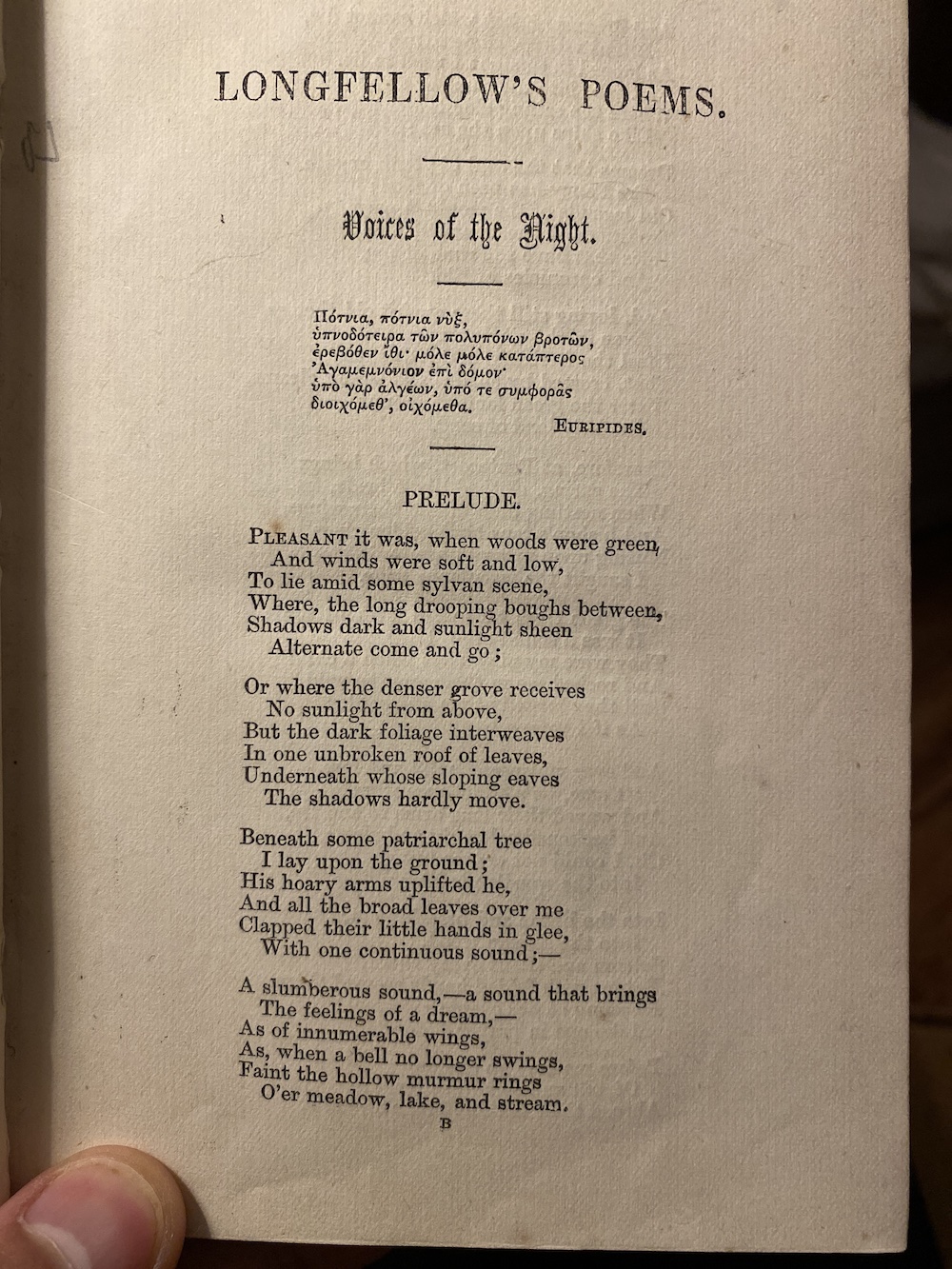
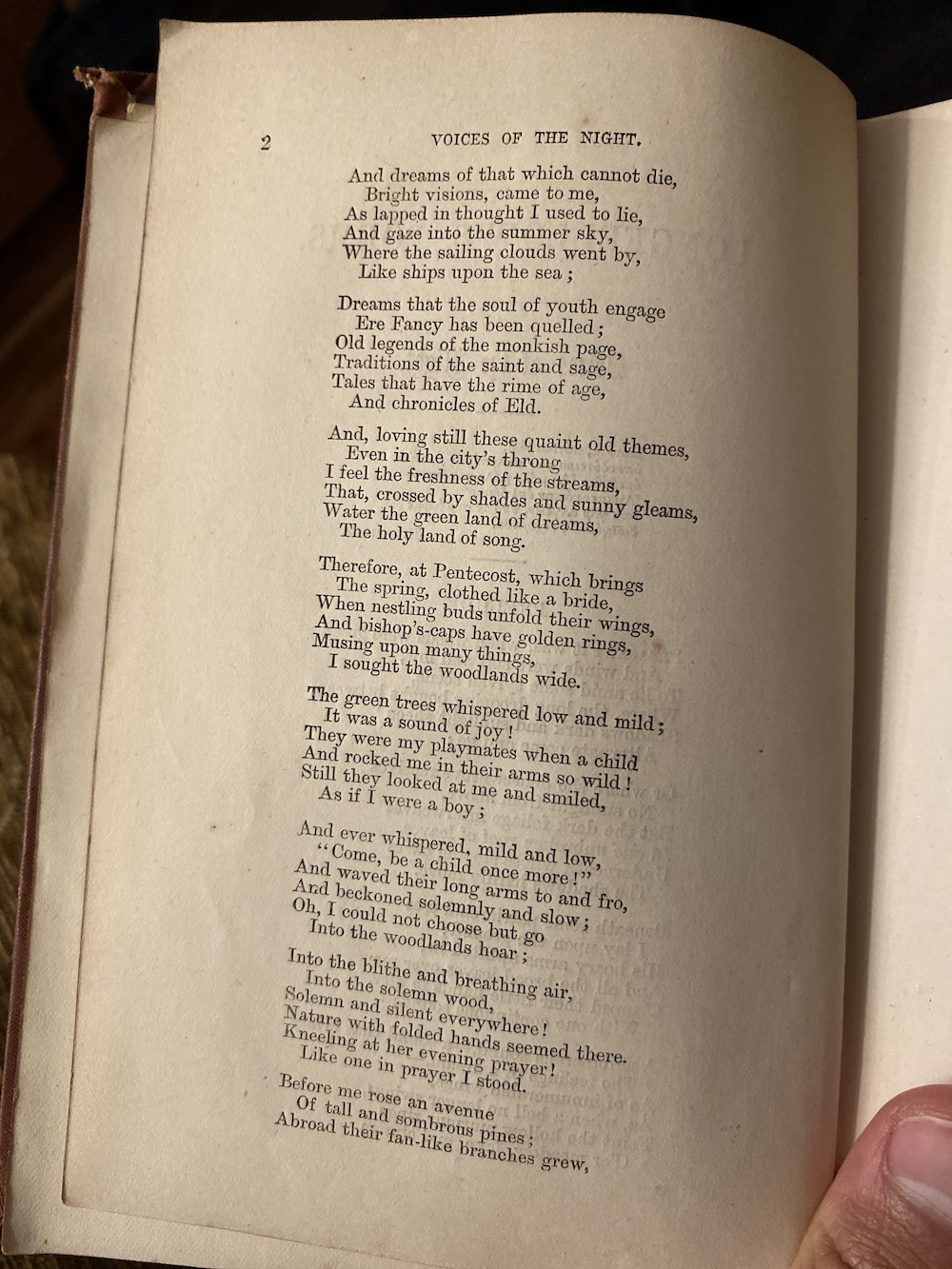
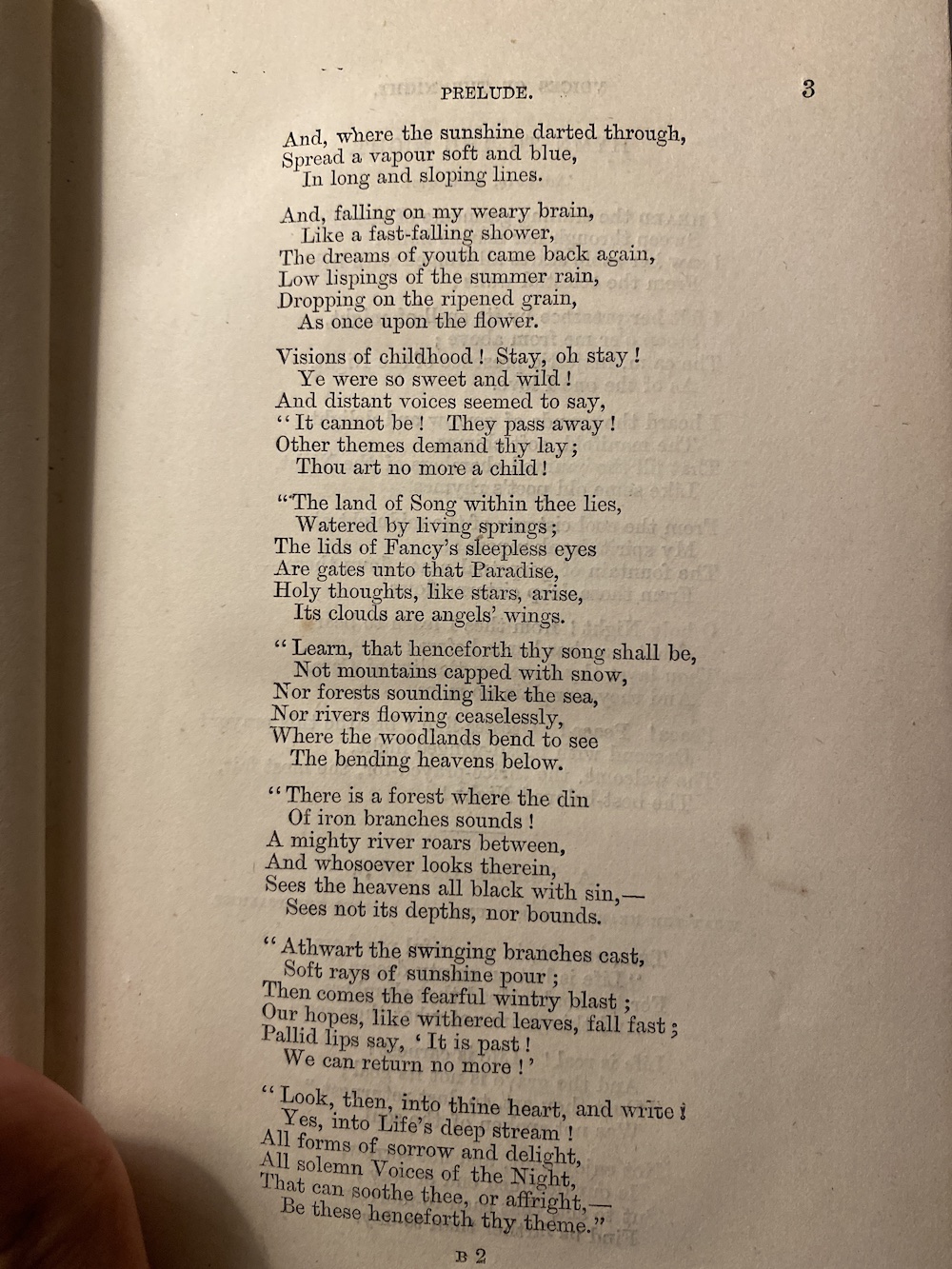
A Psalm of Life
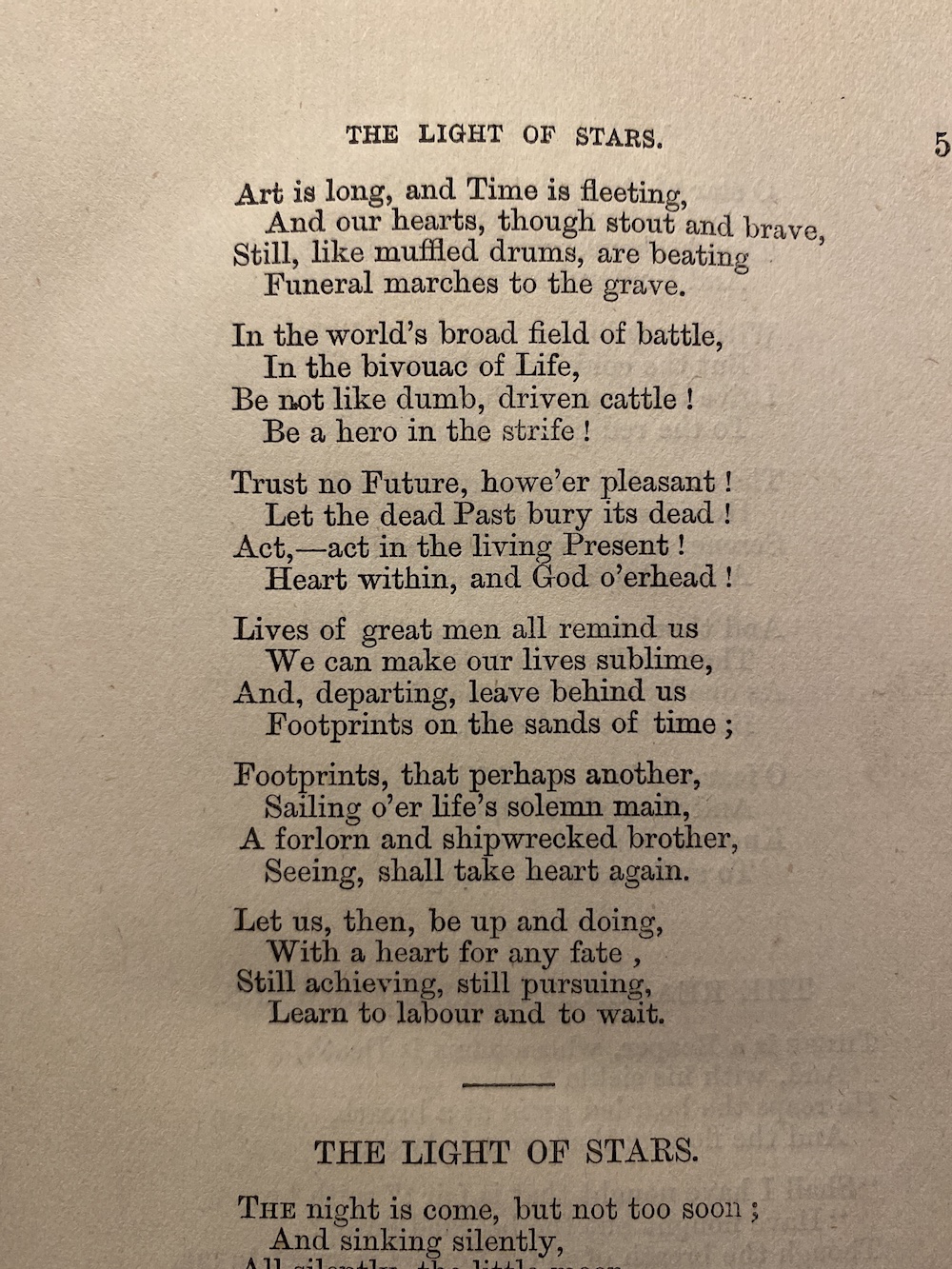
Footsteps of Angels
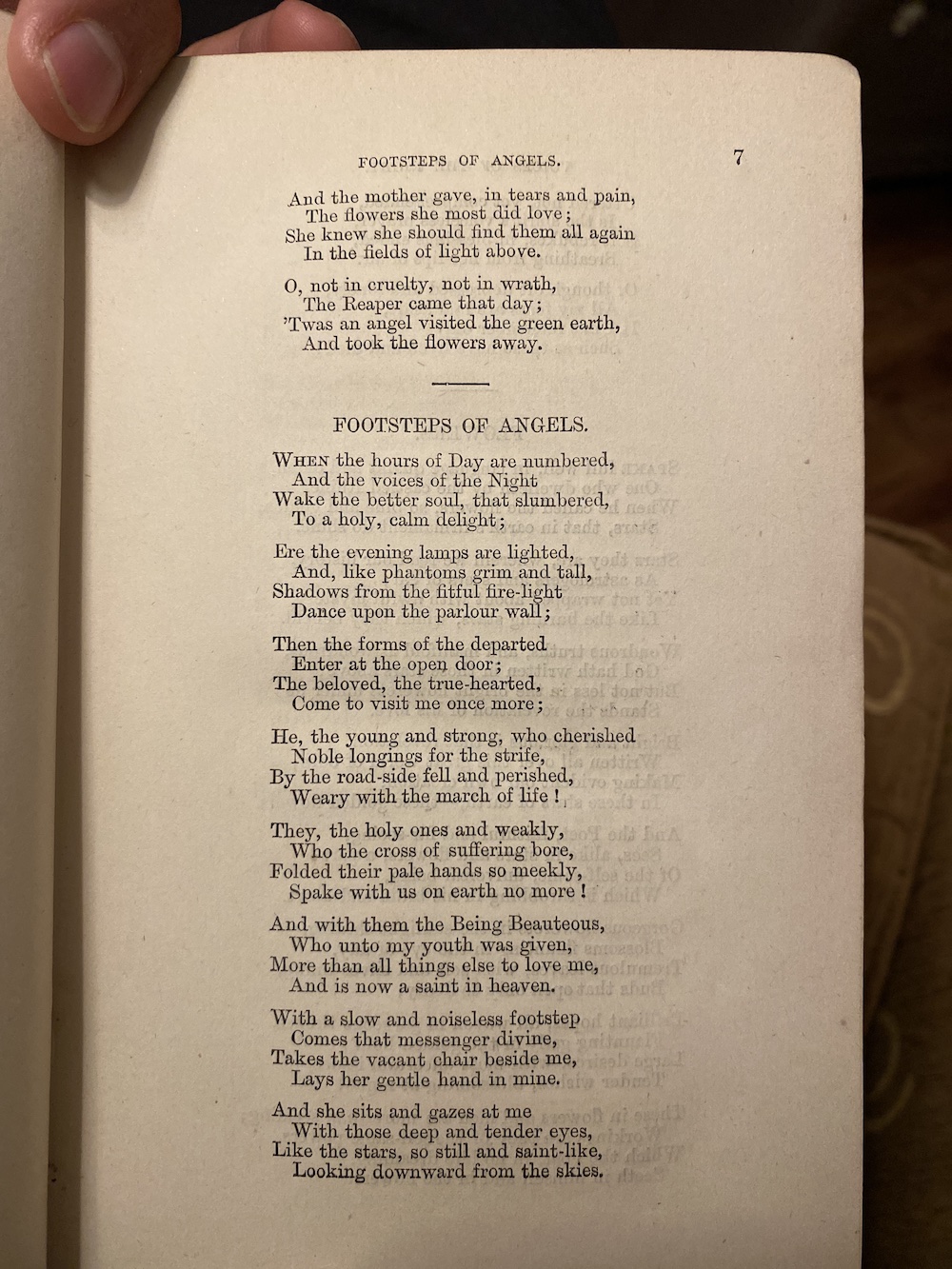
Flowers

I hate RSA.ie, I absolutely abhor Ireland’s Road Safety Authority.
I don’t believe in omens or fear
Forebodings. I flee from neither slander
Nor from poison. Death does not exist.
Everyone’s immortal. Everything is too.
No point in fearing death at seventeen,
Or seventy. There’s only here and now, and light;
Neither death, nor darkness, exists.
We’re all already on the seashore;
I’m one of those who’ll be hauling in the nets
When a shoal of immortality swims by.
If you live in a house - the house will not fall.
I’ll summon any of the centuries,
Then enter one and build a house in it.
That’s why your children and your wives
Sit with me at one table, -
The same for ancestor and grandson:
The future is being accomplished now,
If I raise my hand a little,
All five beams of light will stay with you.
Each day I used my collar bones
For shoring up the past, as though with timber,
I measured time with geodetic chains
And marched across it, as though it were the Urals.
I tailored the age to fit me.
We walked to the south, raising dust above the steppe;
The tall weeds fumed; the grasshopper danced,
Touching its antenna to the horse-shoes - and it prophesied,
Threatening me with destruction, like a monk.
I strapped my fate to the saddle;
And even now, in these coming times,
I stand up in the stirrups like a child.
I’m satisfied with deathlessness,
For my blood to flow from age to age.
Yet for a corner whose warmth I could rely on
I’d willingly have given all my life,
Whenever her flying needle
Tugged me, like a thread, around the globe.
- Life, Life by Arseny Tarkovsky